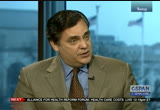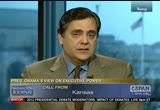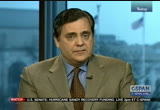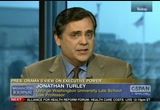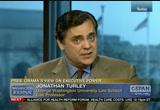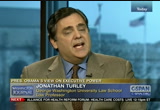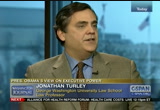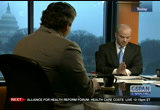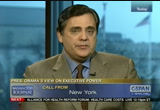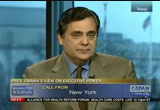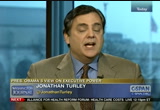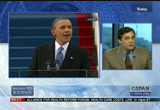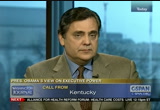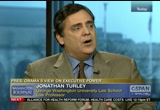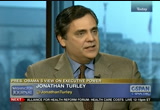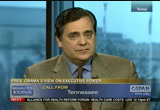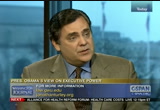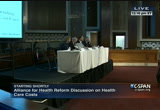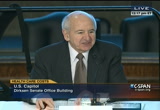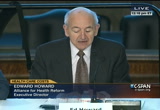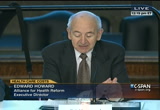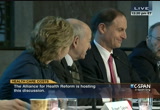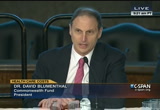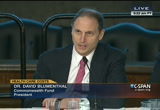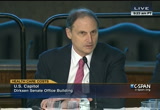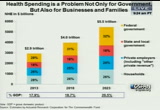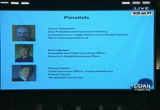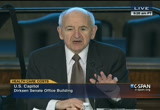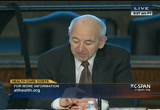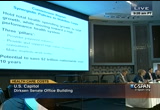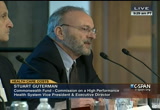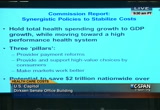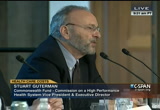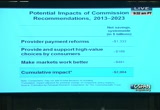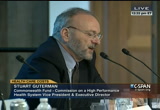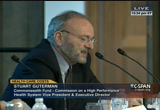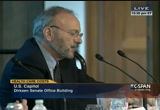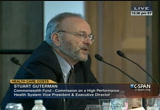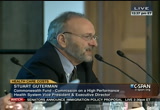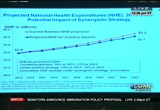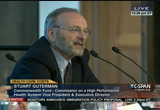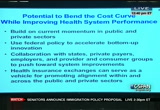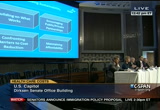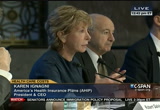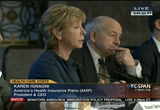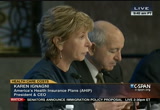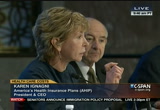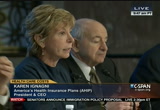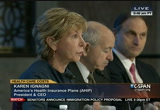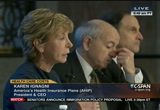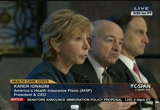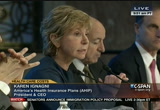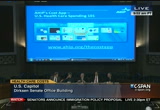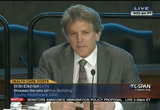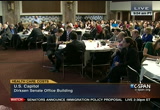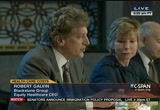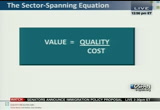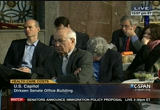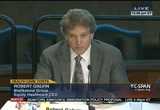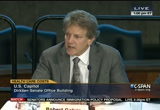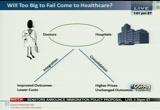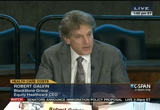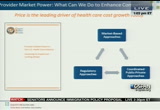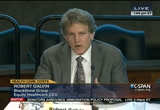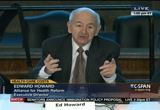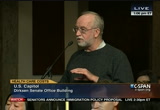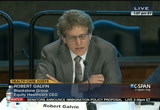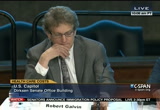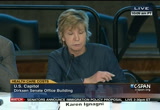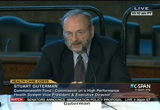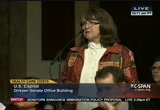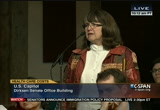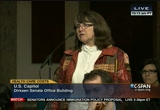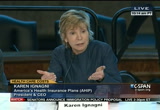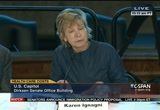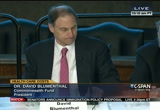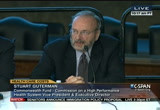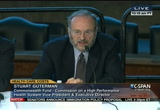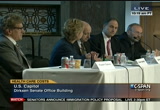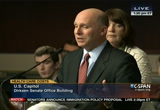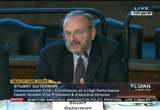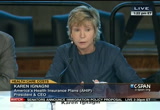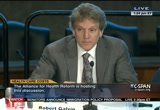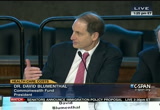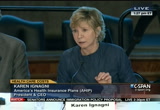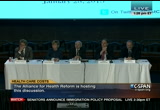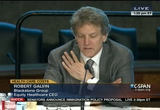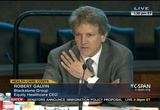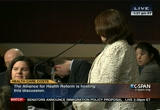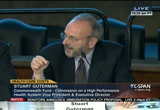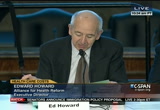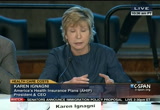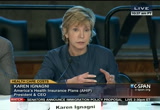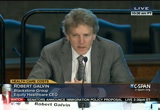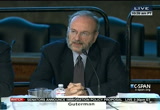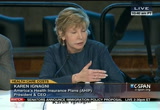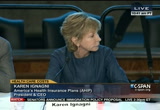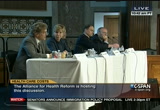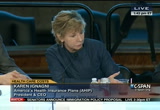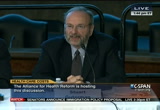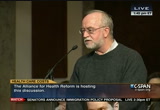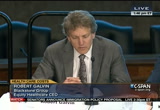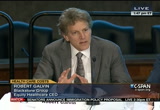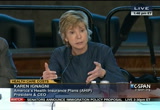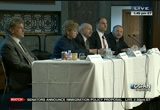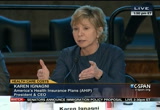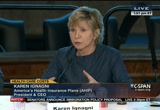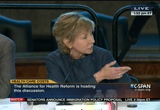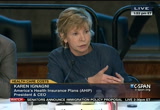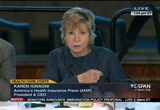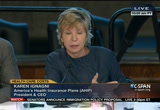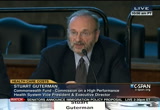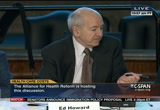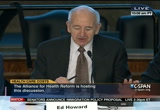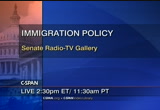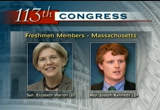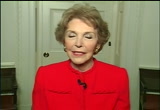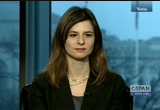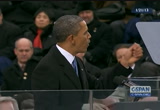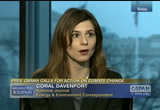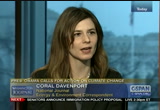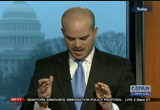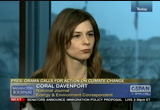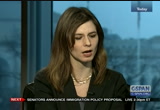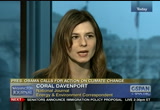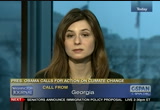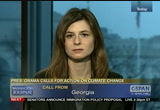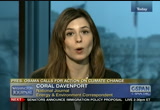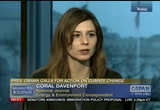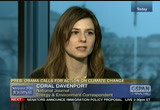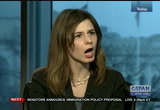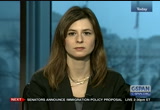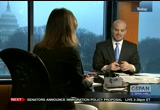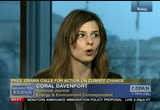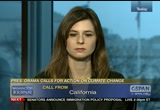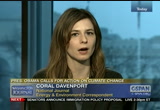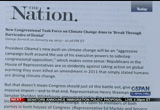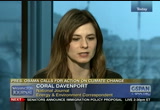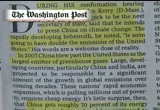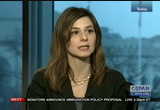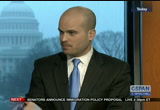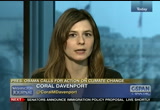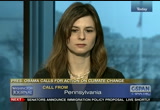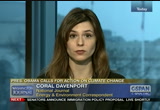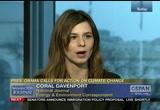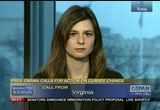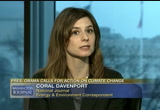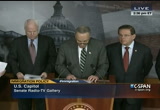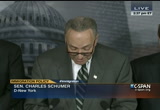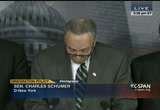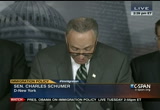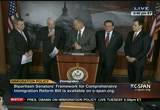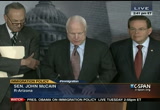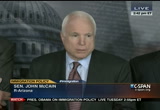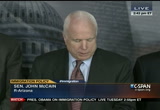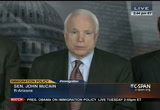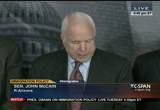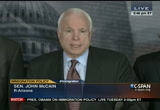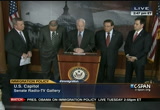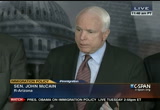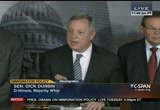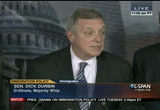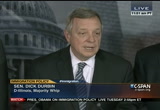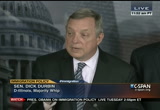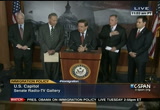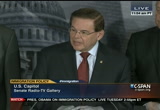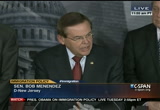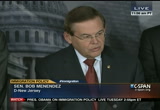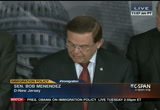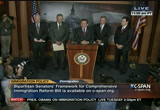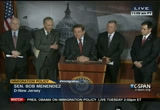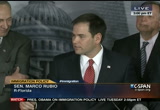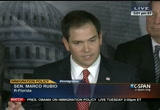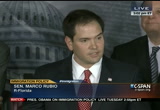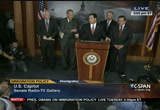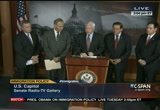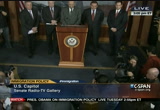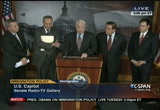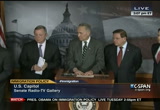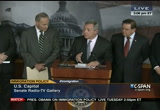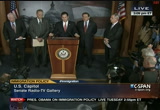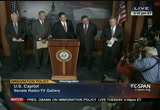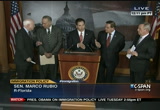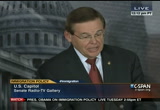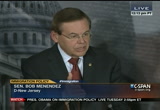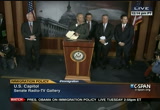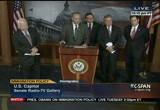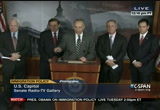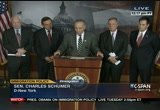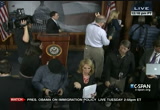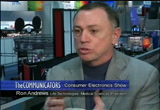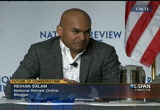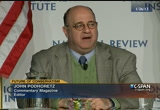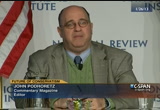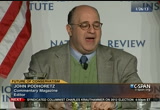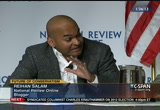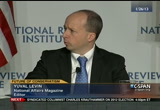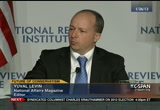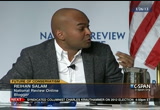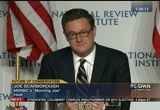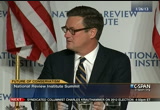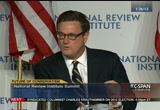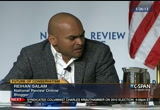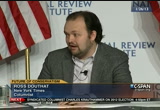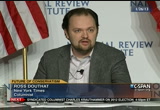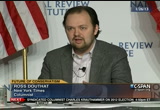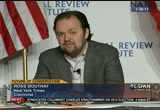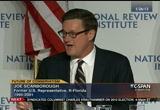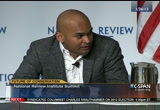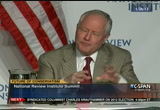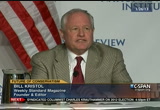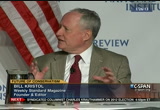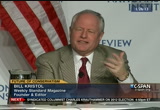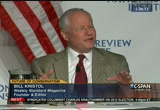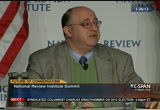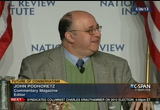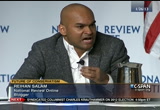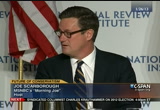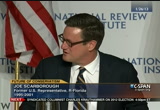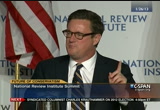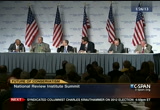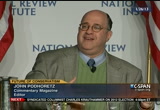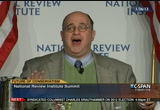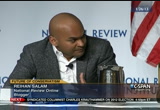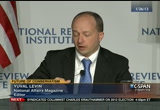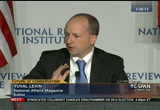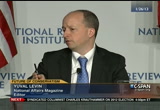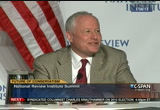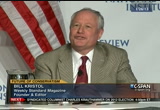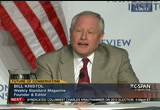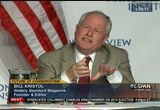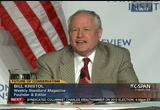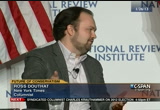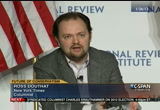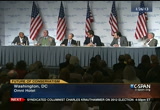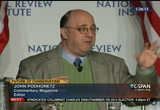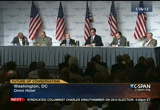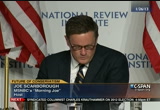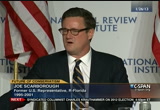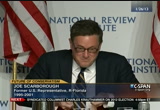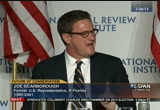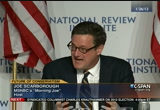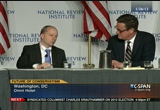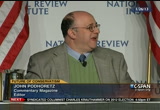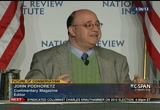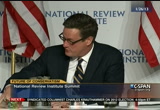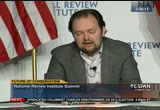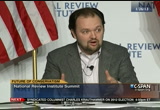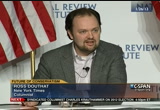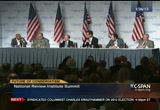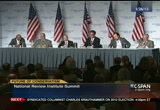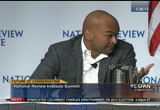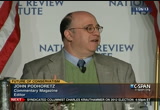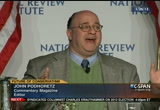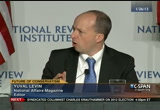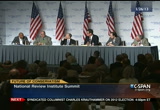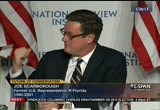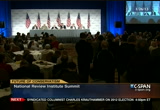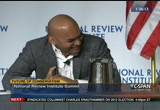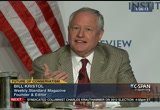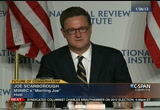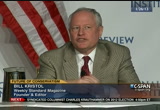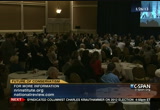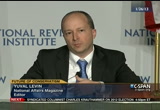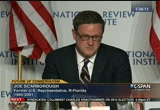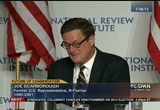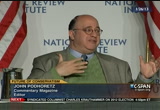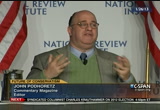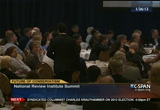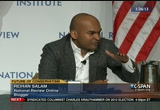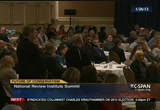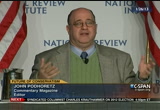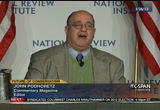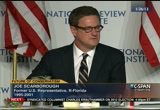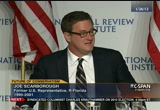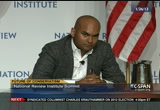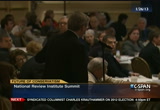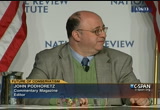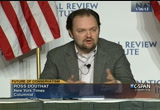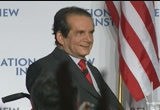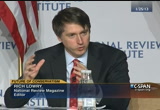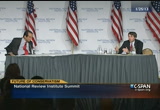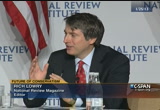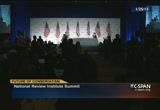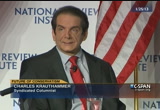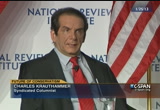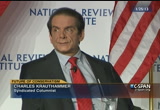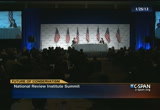tv Public Affairs CSPAN January 28, 2013 12:00pm-5:00pm EST
12:00 pm
these unconstitutional powers and you have republicans that defended them under bush so you have a perfect storm. there is literally no party fighting for civil liberties today. the civil liberties movement >> laughed but fell on the republican line. >> the morning, how are you today? just to underscore the conversation that has taken place, i am conservative so i live in a part of the country or attend not to worry about these things. recently i read a piece in "the wall street journal" about a program under the executive branch called "national counterterrorism center."
12:01 pm
if there was reasonable evidence suspecting somebody of terrorist activity they to do surveillance. they could dig up the records on any american at this point for any reason. they are just looking for suspicious activity. one of the things they are looking at, my wife and i had done some traveling. the medical records -- these things i find very troubling. i love my country. but when i see stuff like this i find it troubling, particularly when the protection we have had from the legislative branch -- now they are worried about fiscal cliff and guns. it is almost like a stealth program that is moving right by us pass -- moving right by us.
12:02 pm
if they suspect me of something then fine. i am not doing anything wrong. they just need to leave me alone. guest: he said the right to be left alone is the most important right in the constitution. he did not say freedom of speech, he did not say due process, he said the right to be left alone. i am afraid your fears are well- founded. this president has given a windfall of powers to the national security establishment. in another hearing i testified in congress about the security state -- and how we're spending
12:03 pm
billions of dollars to support thousands of jobs and this whole apparatus does nothing but look for chairs in the united states it is sort of a perpetual motion machine. the end of recycling cases, hitting the same people over and over again. what is fascinating is we are on the anniversary of dwight eisenhower's farewell speech where he warned the american people that this was a complex that could push into war. i think what you have seen is not as the growth of the industrial complex, it has many of the attributes dwight eisenhower has talked about it continues to expand and
12:04 pm
president obama gives them more and more power. when people challenged it, the obama administration will come in and argue that they will keep evidence from the court. the logistical everything a state secret, which they have done. it is the worst possible situation. i think when you look back at eisenhower it should be left this way. it is a lot like our security space. host: a few questions on twitter about whose job is to push back against this -- "is it the court's duty to keep the executive from trouncing congressional powers or is it the congress's duty not to get trounced? guest: it is both of theirs. we have a wonderful system that was developed by a genius, james madison. he created a system of tripartheid branches that notably do not have enough power to govern alone. madisonian austin.
12:05 pm
or four congresses have been the worst in the history of united states of the total abandonment of the check and balance. fact he is by letting court liberal and democratic values. the republicans took that same position under bush says they are silent. the result is, we have now check on that authority. to make matters worse, the court system has largely been taken offline. when president obama said that he can define whether something is a war and therefore circumvent congress and intervene in the libyan civil about intervening in syria -- i went to the core with members of congress and the challenge a
12:06 pm
democrat and republican and these are the good members. we said you are circumventing a clear requirement of the constitution. we could not get a hearing because the courts of limited standing, as it is called. there are now many constitutional violations that cannot be subject to judicial review because no one has standing. we have a latent violations of the constitution and we literally cannot get a court to look at because they have narrow standing requirements. the framers would have viewed this as absurd. this cannot be enforced but they seem to think it makes sense greenhead >> the founder and executive a director for prisoners. guest: we work with prisoners who are 70 and 80 years old who
12:07 pm
are low risk and high cost and we work with states to develop ways of dealing with what is an inmates. these inmates put a huge burden on the state so we work with them, not necessarily for release but in some cases we do or four alternative forms of incarceration that reduce the cost to the state while improving care. host: anthony is next from miller place, new york. caller: just prior to obama in office, there was a lawsuit pending and cspan have a guest on from the telecommunications industry. there has a pending lawsuit but when barack obama came to power, he was claimed to have been a constitutional law scholar which i found very revealing that he had done something that eliminated the
12:08 pm
possibility of that lawsuit. it was against the telecommunications industry for spying on americans. i believe it was prior to 2005. the nsa was spying on e-mails in any form of communication between americans'. all whole lawsuit i think would have revealed a lot of criminality on the part of the bush administration as well as spying on americans. i wondered if you would comment on that -- interoffice e-mails that were supposed to be released from the presidency of the bush administration -- there was a chiefs of staff and stop -- i believe that was subpoenaed but it was never revealed. what happened in that particular case? guest: your memory is quitewhen
12:09 pm
president obama was a saboteur, he talked about citizens -- was a senator, he talked and ran under protection of privacy and many libertarians side. as soon as he got into office, values. most notably, he worked aggressively to snuff out dozens of citizen lawsuits. respected organizations to expose the violation of privacy laws and possible criminal conduct. the obama administration, like the bush administration, stomped down these lawsuits and day won. they got most of these lawsuits dismissed. it was a massacre. some of these losses were
12:10 pm
getting to a point where we ruling. acknowledge standing and say you cannot violate the privacy of citizens and president obama and his administration blocked it. we have seen that throughout the four years of the obama administration. what he actually does in court. gay-rights is a good example. inauguration is not the present we see in court. for the early part of his term, he was in court fighting to protect oma and don't ask, don't tell. support that view so there is a disconnect. public-interest litigator is like myself, this is an extremely hostile administration.
12:11 pm
there is no change between this administration and bush. this administration has been more successful in that sense. host: let's go to louisville, kentucky, independent line. caller: i am confused because i am getting background noise or something. i want to ask about the benghazi situation. in the hearings the other day, even through the secretary of state, the democrats in congress will not criticize the president playing politics. i would say 50% of their questions were valid but the democrats, it was just a victory lap for hillary clinton and i saw no question at all about her conduct during the incidents and the subsequent investigation. i'll let you answer that off the air.
12:12 pm
guest: unfortunately, this is a reflection of where we are now. there used to be members of congress that put party aside and they fulfilled their checked and balanced role. some of our greatest senators were people that challenged even their own president, even program people in their own party. that does not happen anymore. we have a congress that has become an extended kaiuki dance -- kabuki dance where the democrats ignore flagrant violations and the republicans often exaggerate violations and it becomes this absurd kabuki. there is no serious legislative work regions madison truly believe the that he gave that -- ambitions that or pre- existing and he gave away of expressing themselves. that does not happen.
12:13 pm
part of it is because we have a we have two parties that are largely for more -- formulaic. from twitter -- guest: first of all, people have to be more active and they have to vote and stop acting like chumps. we have become a nation of chumps. we let them convince us every election that is all about red states/blue state. it is a game that is run on the american people every two and four years and we fall for it. the same people are recycled for the leadership does not change. you need to get more active and you need to oppose some of these currently in office. you need to break the monopoly of power of these two parties. we need a third party.
12:14 pm
that is worth working for. nothing will change as long as these two parties control power in the united states. host: last question -- caller: good morning, i appreciate you letting me get through. i sure appreciate cspan. mr. turle., you're a bright and wonderful person because you are telling the truth. many people come in here and it does not matter. people, you are looking out for us and i appreciate it. you give us a clear view of what is going on in all three branches of our government. there was a guy in the 1960's by the name of ralph nader who
12:15 pm
was a great guy and i wish he would run again. do you believe in things like disclosure, information? do you believe in blowing the whistle on people or outright cruel? guest: ralph nader is a wonderful person and yes, i believe in transparency and disclosure. we've got to remember that we are powerful but we are not using our power. as citizens of this country, we have become passive. it is like we have been worn down and don't believe we have the ability to change. we do. these people in congress want you to be passive. they want the system toi think the only question is how angry and active we need to be and change the way our politics is
12:16 pm
going instead of complaining. host: jonathan turley is a law professor with george washington university. >> you can see that discussion again at our website. we are live at capitol hill for an event looking at health care costs. this is folks -- this is by the folks for the alliance of health care reform. they will look at the impact of the affordable air cap -- of the affordable care act. live coverage here on c-span.
12:17 pm
12:18 pm
spending in the united states. we all know that health care is now a huge part of our economy. accounting for almost 30% of gdp. that is to point trillion dollars. -- that is two trillion dollars. i am sure the policy students play a drinking game while watching programs like this on c-span based on how many times the word "unsustainable" is repeated. those same 2011 spending figures released earlier this month revealed that for the third year in a row aggregate spending grew by just 3.9%, the smallest increment in decades. to paraphrase ross perot's running mate in a debate many years ago, "why are we here?"
12:19 pm
at least one response to that question is we do not know if the health-care cost dragon has been slain or is just hibernating. how much of the slow increase comes from the sluggish economic recovery where people without insurance postpone care over which they don't have any kind of discretion at all, and what about the chronic conditions that continued the development of more sophisticated and expensive treatments and tasks? and for the most expensive health care program there is the fact that 10,000 baby boomers are joining me in the over 65 club every day. despite the encouraging numbers about 2011 there is still a lot about this issue to be discussed and analyzed. and here we are with what i think is going to be a very good program on that topic. we are fairly pleased to have, as our partner in today's
12:20 pm
program, the commonwealth fund. and we are especially pleased to have as our co-moderator today, dr. david blumenthal. i will mention that his policy an analyst -- on top of his policy and analytical expertise he is a care -- welcome to your first online briefing as the head of commonwealth. we are pleased to have you here. >> i appreciate the alliance's work on this briefing and many others that we have done with
12:21 pm
the alliance. i am also very grateful to our two guests, bob galvin and karen ignagni, and to my left stu guterman. i'm going to try to set a little bit of context for this discussion. it is of course about stabilizing health-care spending. the commonwealth fund commission on a high-performance health system was driven by a fundamental philosophy of -- on that greek philosopher yogi berra footnoted -- at great
12:22 pm
philosopher yogi berra who noted that when you reach that for the road you take it. we are confronting a very difficult political choices with respect to public and private programs and how to continue to ensure america's population. on the one hand the choices to cut payments, reduce benefits for covered beneficiaries, restrict eligibility, a whole series of things that are very hard for public policy makers and the elected officials to do. and which fundamentally take things away. it is our word in everything but name. the other route which is less discussed and harder to quantify, but int he view of the
12:23 pm
commission it holds promise for the future of our health-care system, is to reengineer health care to get more value out of the money that we spend. regardless of which route we take or which combination of route we take, we believe the engineering process has to go forward to mitigate the pain of the cuts that are coming. to avoid as many as cut is possible. we believe that the opportunity is huge -- huge to make the health care system work better, a huge make the markets look better. -- huge to make the markets look better. we also took the perspective that this is not just in medicare and medicaid and public sector problem. the costs of care fall even more on businesses, individuals,
12:24 pm
states, and localities than they do on the federal government. if we are having this discussion today in a new office building of the congress -- in an office building of the congress. we do believe the federal government can influence public and private sector spending. looking out to 2023, the federal government will be covering 32% of the total cost of health care where private employers will be covering comparable amounts. the choices that we face for not just federal government but also to other stakeholders in the s ystem. it is also clear that we need to engage consumers.
12:25 pm
not just consumers of public programs but consumers of private programs in the effort to contain and make stable the cost of our health-care system. it is always worthwhile reminding ourselves of 5% of our population accounts for 65% of the costs of health care. that population, more than any other, needs assistance with better information and an opportunity to control their destiny in the health-care area. we cannot move forward effectively without empowering them and making the system work better for them. the panelists that you'll be hearing from, stu guterman, vice president and executive director of the commonwealth fund's commission on a high- performance health system --
12:26 pm
karen ignagni, and bob galvin of the blackstone group. we hope you will find this worthwhile. i think our first presentation will be from stewart. -- from stuart. >> if i can handle the bulk of housekeeping before you start. you have information in your packets that include not only the slides we have available, but also materials that i hope you will find useful in the background. there is also an additional sheet that lists a bunch of other materials that we saved trees by not reprinting. if you are watching on c-span
12:27 pm
right now and have access to a computer you can follow a long with our power point slide on our web site. there will be a web cast available tomorrow followed by a transcript of today's cost discussion in a few days on our web site. you will find a green card in your kits. before you leap we very much appreciate you filling out an evaluation form that you will find, the blue one, so we can approve -- we can improve these briefings. as david said we have three terrific panelists today. i should have mentioned in introducing david that in the
12:28 pm
past several years see, in addition to his other duties, he chaired and continues to share the common of commission on -- the commonwealth commission on a high performance help system. -- high performance health system. >> thank you ed, and thank you david. we produced this report on confronting costs to try to address the problems that they described. as david said, the underlying principle here is that it is a health system problem. how rigid health spending put pressure across the board on federal, state, and local governments. the problems that health
12:29 pm
spending causes needs to be addressed because it is a reside system that is pushing down on one part of the system to address this problem and won't do away with those problems even if it does solve some of these imminent and a parrot symptoms. -- an apparent symptoms. the first thing the commission said needs to be done is that we need to set a total health spending target. the figures are well known, the united states spends much more money on health care than any other country in the world and the commission felt that helping gdp growth should be a target for nationwide rather than federal government.
12:30 pm
they view this as a motivating force similar to the action taken by the massachusetts state legislature which set a target for state health spending. they felt that this would help drive action to take and implement policies that are effective in controlling health spending. they didn't mean it as if you do not fit we will chop off your feet. they meant to propose a set of policies that they felt were going to be effective and if that target is not met by implementing the policies than those policies ought to be accelerated further. the three pillars that they are recommending is a three pronged approach -- and
12:31 pm
providing payment reforms. increasing volume and intensity with out decrease in confidence to patients. the second pillar is to provide and support high value choices to consumers. that means not just to increase skin in the game but to provide better choices that consumers can make and provide them with the information to make those choices and reward them for making those choices. and the third pillar is to make markets work better so that regardless of what approach you take the incentives that are embedded in the system will work better and be more effective at producing the results that we want, which are essentially better health the bette
12:32 pm
at lower costs. we still have the potential to save two trillion dollars nationwide over two years. that was the result that we got. the impact of these three sets of policies is portrayed here in this slide. you can see that two-thirds of the two trillion dollars worth of potential savings are in provider payment reforms. that makes sense because the key here is to provide better incentives, better rewards for the health care delivery system to produce the kind of care that benefits patients in a more efficient and effective way. the increases in information and
12:33 pm
better choices for consumers was estimated to produce about $190 billion in savings over a 10- year. period. a couple of the policies embedded in these pillars -- among the provider payment reform we are talking about accelerating bundled payments for health care episodes to force the issue on providers getting away from thinking about providing services to the patient in front of them but rather thinking more broadly about how the patient can be treated. the bundle of services provided to those patients. we are talking about strengthening primary care and providing support carotenes for high-cost complex patients. that is where the money is as was illustrated in the slide
12:34 pm
that david presented. it is also where most of the benefit can be because these folks have multiple, grit -- multiple chronic conditions and are in dire need of more coordinated care. we are really talking about restructuring medicare benefit packages, that we are referring to anas "medicare essential." it is split up into private plans and a policy that most medicare beneficiaries have in traditional medicare. to provide better information by enhancing clinical information
12:35 pm
available on outcomes and patient experiences. that is necessary even though it accounts for a relatively small proportion of total spending. the total savings estimated. it is necessary to make the system work better. you do really need to engage consumers, but engage them with positive incentives. there has been some interest in this medicare essential option. we are in the ops -- we are in the process of getting that paper published. we are in review. we would be glad to talk to folks about the details of that proposal. under "making markets work better," we are talking about simplifying administrative policies so you have reduced
12:36 pm
administrative rights in the health-care system. we are talking about malpractice reform that focuses on the adoption of best practices and rewards position and other practitioners by adopting the best practices and hopefully that will not only increase patient safety but reduce malpractice claims and reduce malpractice premiums that many doctors find so burdensome. the two trillion dollars in potential savings over a 10- year period tend to fall across each of the different major sectors of the health system. the federal government, we estimate, will save money over that because costs will grow more slowly because they will be better integrated, better informed, and there will be incentives in place that do not
12:37 pm
bribe providers to provide better care but reward them for providing better care. state and local governments will benefit because of the savings in the medicaid program. also because state governments are large employers in their area. private employers will benefit because they will have a better health-care system to bring their employees into. health-care costs will grow more slowly. households will be a major beneficiary. they pay the taxes that support government expenditures. they paid premiums through their employers for health coverage. they forgo wage increases that
12:38 pm
could be much higher if health costs were not growing as fast. they believe are the beneficiaries of the whole two trillion dollars in the end. we are not talking about the blood in the streets. people fighting over dwindling -- over a dwindling pie. i would posit that only in health care what the growth from two 0.9 trillion dollars in 2013 to 5.1 trillion dollars in 2023 would be referred to as a shrinking pie. there will be plenty of resources flowing into the health-care system, just not quite as much as would be flowing if nothing was done. we are talking now to give you some sense of the magnitude of this. we are talking about the
12:39 pm
.rojected health policy twee if you say two trillion dollars in that growth, you would be reducing health spending to only 40 trillion dollars over the next 10 years. you would be cutting the growth in health spending from an estimated 90% under current policy to only 75% over the next two -- over the next 10 years. we really have a lot of resources fund in the health- care system even under the best of circumstances. the idea is to use those resources more effectively. we have a set of policies that has the potential to lower the cost. the hard part is getting them passed, enacted, and implemented effectively. we need a set of actions.
12:40 pm
we need to be building momentum in public and private-sector programs. we have a lot of examples of real action taking place now among providers, among purchaser groups pushing for action, and we can build and accelerate that. this is not based standard we are talking about, we are talking about accelerating action that is going on. we need to promote that acceleration and promote innovation. we need more collaboration with states, private payers, employers, and provider and consumer groups to all parties involved in this to push toward system improvements. and we need to look at the vehicle being put into place at the beginning of 2014 for the health insurance exchanges and see how they can serve as a vehicle for promoting alignment across public and private
12:41 pm
sectors. i want to thank all my colleagues for putting together this commission. i look forward to your questions. >> thank you very much. we will go to karen igagni. >> i want to say we are very happy to participate in this important discussion. we have been longstanding fans of the alliance. we think the commonwealth fund under david's leadership has now put something on the policy table that will read nicely. we appreciate being here and talking about that. i think in light of what stuart was going to do and what you may be thinking either here in capitol hill or in the stakeholder community. what would be helpful to you is
12:42 pm
to talk about two things. one is a strategy that we might be thinking about systematically addressing health-care costs before turning to specifics. and turning to specifics, how do we think about the policy agenda? i want to come in behind him that not just the agenda at the federal level, often in washington we talk about that, but also to think about at the state level and private sector and how all of the different strategies. i would like to take a few minutes just to kick off the discussion. strategically i think there are five things we want to think about. david began this way, first is light and the lens. we need to talk probably in the policy community about total cost containment. a silo-by-silo approach, whether focusing on medicare, medicaid, or public programs, leads us to the public center -- to the
12:43 pm
public sector to broughton higher spending. from the perspective of a government that is bad because we have to bring all of that under control. but from the commercial perspective, individuals purchasing on their own and businesses wanting to stay and continue to converge -- continue to offer coverage, that is from their perspective. we have to have a broad discussion of total cost. second, do not reinvent the wheel. there are very significant developments going on in the private sector that we think can be done synchronous lee with the public sector initiative. we can actually move the needle much faster. having discussions about how to exactly capture that and what to do -- that is very important. three, i think we need to broaden the discussion not only to total costs but to think
12:44 pm
about how you achieve an agenda or the federal policy agenda, the state policy agenda, and the private sector initiatives are aligned. what will move the needle? what will provide incentives to move in the direction of cost reduction? and i want to talk about a couple of things to do that. that is the policy collection. that is the policy question. and how to think probably about all of them at the same time. next, i think we need to clear the barriers that are standing in the way. i know bob is going to talk about consolidation. that is one example. i want to give you another example. in the commercial area for private purchasers and individuals purchasing on their own, in the private sector we are dealing with cheering. how do you identify patients where the high-performance networks and physicians and
12:45 pm
hospitals -- there is significant results to report. in a medicare advantage, we cannot yet do tiering. that is one small strategy to achieve the kinds of things we are doing in the commercial arena that can be thought about. finally, i think we need to think about the issue of affordability very broadly. one issue we have been talking about here on capitol hill is that the extent which the provisions in aca that adds cost, that will put pressure on individuals and small businesses not to purchase. we need to get people into the pool to make it work for everyone, as demonstrated by the examples of the state level. that is an example of that. moving to the policy agenda. there are seven things i want to
12:46 pm
talk about. first, overhauling the payment system. this is going on in a very comprehensive way. there is not a one size fits all with respect to how it is being done. it depends on the community, depends on readiness of physicians in hospitals to accept risk and accept prospective payments. we are talking about medical homes, bundling, global negotiations in terms of payments. moving from the retrospective payment system to a global approach, a more prospective approach. and to emphasize not only the fact -- not only the cost reduction part of that, but how do a line quality incentives to achieve goals? -- how do you a line quality incentives to achieve goals? we need to make sure we are not
12:47 pm
deciding strategies that yield reductions on one side that create cost shifting in another. the commonwealth fund did an excellent job at how we -- at talking about how we need to look across the board. 3, aligning incentives. this is going to strike a number of you as being rather boring in what is otherwise a stimulating discussion. i want to talk about why i think this is important. we have over 500 measures out there. we need to shrink the number of measures, a consensus on the high value, and have asynchronous to approach from the public to the private sector so we can grow the boat in the same way. -- row the boat in the same way. sometimes the smaller things can
12:48 pm
be the things that we can point to that can really move the needle. we can talk about that discussion. next, prohibiting barriers. i used a couple of examples when i began but i want to talk about a couple of more. there are barriers in the market to sharing information with consumers. in some cases, health plans are forced to sign contracts with providers where they cannot share information. the whole delivery system with the operating challenge is to provide dashboards for physicians and hospital patients. those barriers should be broken. any challenge, legislatively, to inhibit the ability to inform high-performance networks. that ought to be also discarded. it is standing in the way of moving the kinds of payment
12:49 pm
changes that i think stuart talked about very effectively. wellness incentives. we are working with employers to encourage participation in wellness programs, rewarding people for doing so. if we are not able to do that on the individual side. with so many people purchasing on their own, that is something that ought to be looked at. there is going to be a demonstration in 10 states for the individual market. but we think more of a problem about how to encourage individuals -- more broadly about how to encourage individuals to participate in this program. i also want to point out of network charges. there has not been enough focus on out of network charges. what that means to an individual, we talked about government payments and government costs, purchaser employer costs, to the individual, if they are seeking care out of the network, it
12:50 pm
matters if a particular physician is charging 10 times medicare, five times medicare, seven times medicare. we are just finishing up a steady and the results are eye- popping in terms of out of network charges. stuart talked about malpractice. if we want a high-performance system we need to protect positions that are performing well. i want to say two more things. we talked about practice from the standpoint that generally the policy community -- i would say it is important to look at the scope of practice breaking down barriers so physicians can practice at the top of their license, getting as much help as possible implementing coordinated care. finally, i think there is real opportunities if we take the commonwealth fund notion of taking two trillion dollars out
12:51 pm
and we look at what is the best way to do that. we think there is some real potential with respect to state and state leadership, bringing people together in the stakeholder community to develop strategies to become less dependent for dual eligibles on nursing homes -- dual eligibles or nursing homes. to deal with variations in practice at a local level -- often you see variations not only across states but in states. we talked about consolidation but i also think in building construction, we see a very significant increase in building construction these days, which is creating overhead demand for hospitals that will be very hard to satisfy as we deal with the new payment models. those are a couple of samples of places we can start.
12:52 pm
achieving reductions in the cost curve and at least given the protection of the cbo about where we are going to the extent that there could be reductions identified in a game sharing way that could achieve some real progress in terms of moving us forward. the final thing i want to note for those of you to our techies -- who are techies, we put out an ipad app that is free for the public. hopefully it is identical in identifying places to go to achieve costs. also places where sticklers can work together. thank you. -- where stakeholders' can work together. thank you. >> good morning and thank you
12:53 pm
for asking me to speak. i thought that was a great report. i was on the commission for several years. it is always worth reading. it puts a true north and it is aspirational. today i am going to speak on the part of employers, which is the sector user the least from. i will make some comments talking about what we are doing when thinking about costs. i am going to spend the last couple of minutes talking about the two challenges we are facing where i see public and private sector working together is going to make a difference. just to bring home what employers to, there has been 3 million employers to cover benefits for about 150 million americans. for those of you working in government, companies that do this are likeopm. for a company is a balance
12:54 pm
between trying to stay profitable so that you can make profits whether it is for the owners of the company or the shareholders, and hire new employees, and keeping very good employees in your work force. it is always a balance. that is what drives employers to do what they do. it is not just cost. it is the necessity to get talented, healthy employees. with that i am going to talk in general about employers and where we are going. could i have the first slide. i am not going to talk about coverage -- i wanted to show this slide though because when you talk about any employer today, affordable care act has grabbed the attention of the players because it changed the structure.
12:55 pm
there will be an option other than either covering or not covering. i am not going to talk about what percent i think will go or not go, i think what is important is that the common denominator is still going to be cost. whether you are still finding it as a small service and you are paying first dollar, or whether you are giving a voucher to your employees, inflation is inflation. as long as health benefits are more and more important to employees of all kinds then vouchers can inflate the same way as the primary dollar. i think employers are going this date very interested in cost. -- are going to stay very interested in cost. what our employers are doing about cost -- i put up this equation because it does explain
12:56 pm
the highest level which employers are doing -- i think this is a decade and a half old. several of us put this together after the medicare experiment of the '90s did not work out so well for us in terms of maintaining costs and making happy employees. it is -- the way to cost control is through value management. cost has to be integrated with quality, and we define quality as clinical quality and patient experience of care. as an aside, i would say what is so interesting to me in the private sector is i think we both ended up at this equation coming from very different ways. 15 years or 20 years ago, the private care was focused on getting costs out of the system.
12:57 pm
i think the public sector, particularly medicare, was focused on having a regulated delivery system work on its own, and they realized that did not work. i think this equation makes a good point of how we see things. on the private sector side we believe the way to value is to apply a thoughtful way market forces. -- apply, in a thoughtful way, market forces. it is information, incentives, accountability. if we believe we need to do that by getting employees engaged in a way they haven't been informed. -- they haven't been before. and then i think he will see more and more of this thing called vbis.
12:58 pm
employees will pay deferentially based on the value of the service they get or based on their participation. an example of that is leaving copays for diabetics who take their medication. -- is waving copays for diabetics who take their medication. i want to get to two points. employers are very interested in the delivery system. what i have talked about is the employer benefit design the savvy the employee. -- benefit designed visa-a-vis the employee. the same principles apply about those market forces. it is a big move to show the kind of prices you see.
12:59 pm
this was derived by a group calling doctors' offices and calling the different providers of the services -- you see this gigantic variation in price for something as simple as a sore throat. i show this because i know we are not going to save the system by shocking people by sore throats, and i'm showing it because nobody knew it existed. we put in a high lease -- we put in a plan when i was an electorate and an engineer called me. he said, i might or might not like the high deductible plan. but you cannot put one of those in and show this kind of price difference. i could not find it from your team, i had to call all of these doctors' offices to find out the price. therein is issue number one where the sector's need to work together to cooperate. this is going to happen in the exchanges.
1:00 pm
you see less of an issue in medicare because of the administrative pricing. once you get into the exchange's people are going to want to know these prices. it is very difficult to get this information. there are still gag clause as the providers have. you see a lot of information -- innovation going on in the private sector. time simply accessing data. let me hasten to add that the plan sponsors have made an agreement that we're not going to show price data without quality data. if you are going to follow that equation, you can't show one without the other. integrating those data sets means you have to have access to both and we are struggling and i think you'll be struggling to the extent have anything to do with regulating or sitting rules with the federal exchange. the last issue i bring about is
1:01 pm
what is beginning to seem like an unintended consequence of the kind of payment off -- payment reform that we on the payment side and everyone has been supportive, this idea of moving toward more coordinated pavement, were bundled payment. i think all of that is great. if you follow the logic to do this, you need to have providers among the people who deliver care. that brings about coordination -- less silos is a good thing, every industries whose growth is showing as to consolidate. where appropriate consolidation becomes too much consolidation, it becomes a problem because what happens this year have organizations that can become so big that two things happen we
1:02 pm
really don't want -- one is that they have tremendous pricing power, and the pricing power will be the cost shifting that we talked about. medicare will share its rate and to the extent the organized system does well board doesn't do well, they will have the market power to potentially shift cost to the private sector. then innovation starts to get squeezed out. in the job i do now, i'd buy health care for 40 different companies and there is not a day goes by -- i had to already -- and an innovator comes up to me where they have applied principles to treat diabetics online. a company it will send health coaches out to decrease admissions on the health care side. all of this needs an audience that part of the worry when you get organizations that are at
1:03 pm
large is that it's hard to be heard and it's hard for innovation to happen. i set this chart of because it doesn't have to happen. this is another fork in the road. this is what it's happening all over the country. when providers come together, very good things can happen and there are tremendous examples of great care at lower prices. but at the same time, the potential was there for what you see of the other side of the page, which is outcomes that are any better, but certainly the ability to get more price and cost shift. the question is, what do we all do about it? this is the final slide -- this organization that was founded among employers called catalyzed payment reform. this is an emergency -- to try and rationalize what employers
1:04 pm
to on payment reform. one of the issues we are trying to addresses this issue of turning a very good move to global pavement into having a positive outcome for patients and affordability and not the other side. we need to measure because we have no idea what is going on. the evidence is growing. the evidence in this paper is that more and more markets across the country, private sector plans and employers are looking at very high price increases year to year in some of the same markets that have the that qualify for medicare status. so what can we do? we need to measure it. there is no kind of funding and no neutral party that is today authorized to measure what is actually going on. i think we need to make sure antitrust is properly funded
1:05 pm
because i know they really get it at and. my final comment goes back to what david and stewart and karen said -- this has to be a whole system solution. it cannot be that one sector does better and the other does worse. real improvement will come when health care is more affordable and better quality for everyone. thank you. >> terrific. thank you, bob. we now get to the part of the program where you get to quiz the experts. you can fill out a green question card. someone will bring it forward and we will get to as many of those as we possibly can. there are also microphones on either side of the room where you can go and ask a question yourself. if you do that, please identify
1:06 pm
yourself and be as brief in stating the question as you possibly can. you beat me to it. go ahead. >> thank you. we know there are some examples of well integrated systems that deliver quality care at comparable or even lower prices than other situations. i'm curious over the past three years, where there has been a time of relative stability in prices, how those well integrated systems have performed as compared with other parts of the system. has anyone looked to see if there are any differences?
1:07 pm
>> the bottom-line answer is we have not done that study. i don't know if you know, but that's certainly worth looking at. i need there is evidence some of these systems are doing very well. there is certainly evidence they are achieving slower cost growth through their efforts. >> i think it is a great question. i don't know the systematic study, but i can tell you about our database. it's a couple of billion dollars of spending, which is modest by medicare standards, but you can make conclusions. after the last couple of years of these less higher than normal increases, what we have seen is stable utilization, some slight
1:08 pm
increases in quality, and all of the increase driven by crisis. when we look to see what is driving the increase in price, it seems to the hospital, particularly outpatient hospital, especially drugs -- specialty drugs is a secondary one. where we look at the markets where that happens, it tends to be the ones with the most consolidation. the extent you are asking is how are the truly integrated systems doing verses the others? the data we have on that, which is probably not enough of a volume to have comparable, is they continue to perform -- the county to outperform by a couple of points. >> the only other thing i would say to this important question is i have now seen data in the process of being developed for publication. some of that has been published, that shows a real moving of the
1:09 pm
needle in terms of moving to these different payment strategies. taking physicians that are primary care physicians for example in individual practices, one physician, to physicians, connecting them virtually with coordinated care, and seeing significant results both of the price side as well as the quality side, and seeing data from important areas across the country on a real reduction as opposed to something less than that in terms of trend, the cost trend with respect to inpatient broadly. that is encouraging, using a more perspective as opposed to a retrospective approach. there are different approaches and strategies across the country and that the significant thing. it is not a one-size-fits-all, but they can be harnessed it a
1:10 pm
productive way where payers and providers are working together to achieve cost as well as quality results. i think we'll begin to see some of these data now going to third-party review and ultimately to publication, which will be important to get a sense of how all of this is happening area by area. >> let me correct a mistake in response. i misunderstood your question. there's plenty of evidence of examples of integrated delivery systems that are addressing cost and being successful at doing that and improving the quality of care they are providing as well. those around the country in different circumstances -- you will find case studies of a lot of those on the commonwealth fund website. even at that, you have to
1:11 pm
realize many of these systems are operating in the context of a health system that punishes them frequently for doing the right thing. we could have much more of that kind of success if we could address the underlying health system incentives running counter to doing these kinds of things. a lot of these people in the forefront of these movements are actually blocking the current system to be able to do these kinds of things for the good of their patients. >> i think you were there first. go ahead. >> i'm the director of the center for elder care advanced illness. what you have proposed in the report is exciting and certainly should be followed up on. i wonder if we are still sort of missing the obvious question
1:12 pm
mark for most of us in the room, our biggest expense is going to be in the last few years of our life and we're living with a very bad disease. probably almost half our lifetime expenses. we are holding that piece of time to the same quality measures and assuming its part of the same market as all the rest of health care. it seems it really shouldn't be. it is distinct as pediatrics are and we think of them as being a different care system. old, frail, disabled, multiply ill doesn't just need a medical care team or medical home. we need long-term services and support and we need an honest discussion about decline and death. we seem to still be dancing our way around both of those issues. what do you think about the possibility of creating a marketplace that values innovation and tries to put forth a different product that
1:13 pm
could not stand the fragmentation we now have so we would see that time of life as being distinct and requiring a different service array? we would require care plans for each person, we would manage that system and its production aspect and payment aspect because it would be overwhelmingly either public or private on the way to becoming private. how many have the resources to endure 10 years of long term care? it seems that for the money is and yet we continue to put forward the care system designed around 50-year olds for that part of our lives. it does not fit, it cost a whole lot, we spend more on medical care that long-term services and support. every other developed country spends twice as much of long- term services than they do on medical care. we and that medicalizing
1:14 pm
housing. my medical school didn't teach me anything about housing and yet i arbitrate whether people go into nursing homes. there is another frontier that is not quite on the table at how can we get there? >> i think you are right and every patient should have a care plan, whether they are under 65, over 65, were and the frail, elderly population. you are absolutely right about what that does in terms of helping and supporting that patient and achieving the expectations they deserve and seek. one of the things i can report from a health-care perspective is as we meet the needs of the medicaid population and to will eligibles in particular, we are focusing on things like long- term services and support. we are partnering with advocates to actually look at
1:15 pm
housing, look at pathways to move people out of a nursing home and back into their homes and into the community where they can be supported. i think you put on the table a very important issue and i know not to suggest additional programs, but this is an area we really need to pay attention to. this concept of coordination of care is very, very important. we pioneered hospice in the health plan committee to make sure people could die with dignity and support. we can take that concept and extended broadly and it's going to take quite a lot of discussion among the entire stakeholder community, the patient community, but there are real opportunities to elevate the level of care for these individuals and do it in the right way that each of us would want for ourselves or for our family. i appreciate you raising those
1:16 pm
issues. they're very important. >> i think that's a good program suggestion and one that we are actually hoping to be able to move toward over the next few months. we have a flood of green cards. we're going to try to integrate questions from those cards with folks at the microphones. if i could ask you to forebear a little bit, dr. blumenthal has a couple of questions lined up. >> apologies to those it may not get their questions inserted. the first is why haven't you pursued market-based reform that are bottom-up such as for medicarehsa's patients? i have one from this stack of cards that addresses a question to stoop, saying we should use
1:17 pm
policies -- what specifically can the fed's do? >> it answer to the first question, the commission report embeded an awareness of the importance of market forces. the commission and the policies they are proposing lean toward a more positive incentives that include rewarding patients for seeking care from high performing health systems. rewarding them from seeking coverage from plans their high performing. in introducing market accountability in a more positive way. what the commission is less comfortable with is the pure skin in the game approach that
1:18 pm
penalizes folks for not being better shoppers in circumstances where frequently they cannot be better shoppers. that is one. in terms of the kinds of policies, we could see having in the medicare essential plan briefly described in the report, we would have a reward for medicare beneficiaries who agreed to designate primary-care provider and agree to get their services from a high performing health system. they would reap the benefits by sharing in the savings obtained for the program and for the system from getting better care at lower costs. that's the kind of thing medicare policy could certainly encourage. >> there might be a middle
1:19 pm
ground, which is to take the concept you have talked about and think about in medicare in particular the kinds of things bob talked about in the private sector and that employers and health plans are working on together, this whole concept of value-based benefits, to reward individuals for participating in a care plan, having a care plan, following it, participating in disease management. that's why i wanted to use the example of cheering. that's the kind of thing that could be a middle ground and could be brought to medicare advantage, we have a plan to encourage people to choose high- performance networks and so on. this concept of value-based benefits could begin to get looked at very productively from a patient friendly, pro-patient
1:20 pm
point of view to support the kinds of high quality choices all of us want to make. >> i am a physician and health policy and communications consultant. the report is great. you summarized how you set spending targets and that's also the approach massachusetts has recently taken in their legislation to control the growth in health spending. a lot of what we are hearing at the federal level isn't spending targets, its savings targets, kind of a flip. given the projections of actual spending tends to be a little different. we've seen actual spending has been less than what was projected. you talk about the pros and cons of those different approaches of setting spending targets of verses saving targets,
1:21 pm
particularly multi-year? >> you are right. if you know how spending is going to grow with certainty, they are the same thing. the emphasis needs to be on what we think a reasonable amount of resources are to devote to the health system and figuring out most importantly how to best allocate those resources, which is why the commission focused on a spending growth target rather than a savings target. the idea is not to emphasize taking resources out of the system, but to put resources into the system in a way that's most effective for the patients and everyone else involved in the system. it is a matter of emphasis. >> we have two questions i want to try to hit here that touch on the same issue, which is
1:22 pm
administrative costs, which have come up. one questioner points out our administrative costs in the u.s. have been found to be as much as six times higher as the average from other countries. how can they be lowered outside of the medicare for all system or tightly regulated public- private system as in germany? second, what are the current barriers to uniform claims forms and certification processes and other things that could significantly lower administrative costs? >> it just to start off, and i suspect everyone wants to comment here. this is a very good question. first, the aligning incentives points where making sure we are having -- there is a significant amount of this going on now in the private and public sector to reach an agreement on water the
1:23 pm
high value measures? you can't achieve something you don't measure. what are the priorities, where shall we put our emphasis so that we can have everybody rowing a boat in the same direction. it may seem small, but it can have a meaningful difference. credential wing, aligning credential in the private sector, we've created an organization to synchronize credential being so physicians dealing with any one of our health plans would have the same credential in process. we think there are opportunities for the public sector to a line with that. we think that could work out very quickly and very well for physicians. it would yield higher satisfaction and achieve the kind of quality performance we all want. third, there needs to be -- and david mentioned this -- there needs to be a stepping back as
1:24 pm
we think about infrastructure to think about how does icd 10, administrative use and simplification together strategically? what are we trying to achieve? where do the incentives fight one another? what's the best way to actually improve performance and where should we put our emphasis public and private? these conversations are beginning in the public sector and the private sector, but we need to really think about how do all of these things aligned so that we can make sure we are achieving the effectiveness and efficiency? those are just a couple of things to start off the conversation. am sure everyone wants to talk about this. >> i think it's a great question. we on the employer's side tried to make a run at this. it was difficult to sustain. it is impressive. if it was easy to do, it would
1:25 pm
have been done, but it was a classic problem that we could not quite get the group together that could make a difference even on the private sector side. i don't know if you were going to have this but you've been so involved in your former role. we were hoping that it would be a way to get at it. >> i do things better information and exchange of information will reduce costs. but i think the actual administrative costs associated mostly with claims processing, billing, and the management of the provider-payer interface will not be solved by electronic health records. there is a provision in the affordable care act, and i have no idea what happened to that, to encourage uniform billing and
1:26 pm
claims processing procedures, which would be an enormous advance if it were achieved. >> i would be happy to talk about that. one of the challenges now as we move to more of a prospective reimbursement system and away from a traditional retrospective fee-for-service system is how do you achieve some of the objectives with respect to streamlining the administrative process? there is a significant amount of progress going on around the country with our health plans, working with positions in hospitals not only to achieve the cost goals, but to achieve quality goals that in the process look at bundling so you are not measuring every aspect
1:27 pm
of a patient's care. if i'm thinking about a bundle for joint replacement or there have been -- has been some path breaking work working hand-in- hand in physicians with oncologist and health plans and so on, that streamlines the infrastructure in terms of how individual providers or hospitals are paid. as we are thinking about global kinds of initiatives, partial capitation, that streamlines the process these under all of that. as we move to more of eight prospective system, we will see a great deal of progress moving away from a piece rate system and what i see in the market today gives me real hope and i think it's encouraging about what is going on and how it is developing. as these models take hold, -- we
1:28 pm
are already seeing this in the medical home arena -- we've seen medicare has participated with our health plans, rowing the boat in the same direction within a state. making sure the providers know if they are dealing with the commercial as well as medicare -- are similar standards and so on and so forth. there's a great deal of discussion about aligning forces and incentives for change as we look more realistically at what can be done and how it can be done. >> i direct the public policy institute at aarp. i'm also on the board of directors of the leapfrog group. your statements around price it intrigued me. that wondering if it's something
1:29 pm
i should be doing at this think tank because cost and price get so completed in the discussions. we're working with the institute of medicine on the idea that patients think the higher the price tag, the better the quality. what is our role in trying to shift that view from consumers? sharing in the incentives would help a lot. if i go to your web site, do you >> good question. i am glad you were on the leap from the board. a threshold's it is question about prices. let me address that first. is true, consumers think the more it costs, the better it is. they think that in every market. they think that in health care.
1:30 pm
there is the risk that if you show price, you drive everything hire. first of all, that is why i think you should not sell products without quality. they should be combined. second, i think you have to make a threshold decision about whether transparency is good and is going to work better for the system in the long run. and way back when we started leapfrog group, we had an issue. it was a difficult decision. you did not want to put out imperfect measures. on the other hand, you just had a lady at the end of the day -- you would continue to work and make it better -- do no harm -- but you had to commit yourself to the transparency. do not get over-excited. most of the costs in the system are 5%, 20%, at 80%.
1:31 pm
not everything is discretionary. the more we learn about price, the more you will see how much difference there is in a price that people do not know about. and i do think we tend to come down to the means. cpr does not have an agenda on price. our agenda is getting the data out to do something with price. it is so difficult getting the data -- many providers do not even know their prices. the plans tend to want to hold on for competitive reasons to the prices they get. medicare is conflicted about showing its data. we are so early on, we are having problems even getting the data. >> we can work with you. >> karen? >> just a quick post script --
1:32 pm
it matters to a private purchaser, employer, health plan what the charge is as a percentage of medicare? for example, if you look at northern california, a higher consolidated market, versus southern california, you would see a very high proportion of hospital payments. you can see the cost shifting ratio. it matters to individuals. in matters to large employers. it matters to small employers. whether it is 150%, 200%. maybe we ought to have a cost shifting disclosure that would put pressure, actually come on a public discussion about that, which is what happened after mass., after the attorney general wrote her report about what it receding in terms of consolidation and the
1:33 pm
facilities charging the highest prices have the highest quality. and generally, they determined that is not the case in all diagnoses. just basically cost shifting measures -- it means something about what is happening from the perspective of government compression and what happens on the private sector side and how do you track it? that may be another way to track eds. >> susan, what you mentioned it leads into a discussion about what do we do about price, what do we do about utilization. which is the real culprit? the answer is they both are. not only are they both the real culprits among the youth real culprits, but the distortions in price lead to distortions, and they are both the result of market signals that are distorted.
1:34 pm
when we address these issues, this is a microcosm of the approach that the commission is taking. to address this issue, you have to address the prices, the utilization, and the ability of the markets to send the right signals to the sources in that market. >> may i throw in a question that is relevant as a follow-up? in respect to cost shifting, some economists have suggested that lower medicare pricing are the result of a superior bargaining in medicare. they argue that customers with small plants add more than customers in large plants? would you argue that small
1:35 pm
plans cost shift to large ones? and how should medicare addressed the cost variability in the price sector? what do you think, karen? >> starting with the large employers and large markets, large employers are charged on the basis of their specific prices. even in the individual and small group market, particularly in the individual market, the reason you have higher premiums, you have health care costs, then as a baseline if you think of it in a building block approach. then you have individuals to purchase coverage, the older and the sicker, the younger and the help the -- the holder at -- the older and sicker. the younger and the more healthy have not purchased coverage. this is what we hope with health
1:36 pm
reform, that the pools can work the way they are desired to work. there are factors that are non- recurring in the large group base because you have a natural pulling in the individual and the small group. then in the medicare area, generally what we have seen is there has been a compression in government contributions, both in the medicare and the medicaid irina. that has definitely lead over to the private purchaser side. we can track how much cost shifting occurs. you can track it very specifically based on the market position of various facilities and to the extent that they have a market position where it is highly consolidated and they have purchased these smaller and cheaper community facilities, then you see the cost being
1:37 pm
significantly ratcheted up. i will give you two examples. 1 in community hospitals that generally have lower pricing. generally the health plan will get a call saying, you are going from 100% of medicare to much higher than that, just by virtue of dealing with the large system. this is also occurring as systems are consolidating. we used to do a cardiac cap on an outpatient basis, moving back into the system. benefits are 30% of tax or 40% of surtax. now that purchasers in particular and other individuals in the policy community become aware that, i think that will lead to some productive discussion. , cost shifting you have in the
1:38 pm
market is -- how much cost shifting have an market is dependent on the ability to achieve higher payments. that is why i think one of the things that could be very useful here is to track that cost shifting and think about transparency are around cost shifting ratios, at least give consumers and individuals more information than we have today, to look comparatively at what is going on. >> bob is in line. >> i'm sorry. that is two. >> i always like to question things. a well-known and d.c. economist took me aside and said "bob, we realize that cost shifting occurs. we just do not have a model to explain it, so i have to deny it in public." [laughter]
1:39 pm
i think that is a specious argument. i think what differs between large and small employers is essentially, if you are self insured, the administrative services b, which is 12 or 15% of the cost, do the math. if it is scale. it is how insurers have to make their cost. the differences in large and small employers -- i think that is a difference that cost shifting does not exist. i think their arguments to that 1. >> one of the points that frequently gets messed in the cost shifting debate, and it is an observation in search of a theory, and i think there are theories that can explain it. there is an underlying presumption that cost growth is immutable and that is somehow
1:40 pm
handed down from the great beyond and that is what it has be. i do not buy that resumption -- presumptions. i think that cost shifting is something that could be barrett -- could be described as i want to increase my costs faster, and if i can find somebody else to bear the burden of those increased costs, i will pass them on. we need to focus more attention on the underlying costs, because that is really where the issues are. >> i think until fairly recently, much of the discussion in the policy community has really been on premiums. certainly within the two years ago as we were going through a health reform, that was the focus, as opposed to the underlying cost. i think now we are really
1:41 pm
getting under the hood and i think that is really important. with the most exciting things in the report -- one thing in particular that struck me, just the point that you made, i think very effectively, stuart, the amount we will spend on health care over the next 10 years. the idea that we cannot take $2 trillion alps. -- $2 trillion alice. we will spend $17 trillion. and it is very significant for the commercial sector. at think you guys have done something very important, just to talk about what the possibility as well-meaning innovation in the best system that we all want. >> so, since we are talking about whether cost growth is
1:42 pm
inevitable in getting under the hood. there was a question from the retiring chief actuary from cms, that providers provide first and services and it is not easy for such professionals to improve their productivity. this is to the point of whether the productivity -- that is, the value -- of services can be improved and qualitatively improved? the premise of the cost report is that it is possible. so, comments from the panel? >> i think the first questioner who asked how they integrated systems showed it is not as easy as it is in manufacturing. you cannot digitize the process. you cannot globalize them.
1:43 pm
is certainly can be done at 10% to 20% more efficiently, as pfizer and other systems, i think, have shown. i do not think it is making it more productive. at think it is removing the redundancy in the system. the same form we fill up every time we go to another specialist, only now it is on line instead of on paper. i think that is what systems are important. >> and actually, i you did -- you did a great job started the conversation. meaningful use. that is one way to think about it. eyes and there has been a great deal of exciting discussion, -- i think that there has been a great deal of exciting discussion, both across the agency and in the commercial
1:44 pm
arena. now we have to look at meaningful use, look quality outcomes, think about stepping back and think, how do we actually align it the highest bought you opportunity -- highest value opportunity to improve productivity. going to these new models that reward quality as well as cost reduction, i think all of this plays a role. unfortunately, i guess the take away is there is not one strategy. it needs to be a holistic strategy. i think you guys did a great job explaining there are different aspects to all of this. >> if you look at it one way, our health system has been incredibly productive. we have given them every incentive to increase volume and intensity, and that is what we have gotten. in spades.
1:45 pm
we are rewarded for increasing the revenues for not tying the revenues to what we really want to see the system increase. you have to ask yourself -- which system do we want to have increased productivity? >> ok, we have a couple of people who have been very patient. you are a second timer up there, but i know you are going to be brief this time. >> thank you very much. everyone is in favor of integrated care. the flip side of that or the part that has come around is the consolidation of providers, and robert mentioned the too big to fail mode, which has evolved in certain monopolistic practices in certain markets that has resulted in price increases. is there a role for state or
1:46 pm
federal governments to try and limit consolidation, to try to foster more competition between physicians, rather than having a couple of huge players involved in each market? and if so, how do you do that? is there a legislative role for that? >> we are going to figure all of this out at the cpr meeting in april in d.c.. i think when you see the very good things that happen in organized care, you want to promote them. that you appreciate there are very few organized systems in care that have been around for decades. how do you create the right regulatory system, the right market system, the right amount of information to do it? demonstrate that it is a combination of all of them. i do not think antitrust alone
1:47 pm
is enough. i think there has to be measurement. i think you have to allow all measurements of all the government systems so you can have the kinds of performance networks that karen mentioned, and i think you will have to have some kind of oversight. they are starting to that in massachusetts this. -- in massachusetts. i think that this is a factorial solution. i do not know legislation offhand that would do with. i think better funded antitrust is important, but i think we have to figure this out together. i think the sector as to work together to figure it out. you remember that chart. we have to make the systems the really high performing systems they can be and discourage them
1:48 pm
from going down the other path. >> i think that bob gave it a great answer to that. i would just add that the deficit and the policy discussion has been that we prioritize, as a matter of policy, getting to this and haveed state, forgotten about all the other things that need to go along with it. i think the ftc has been doing a great job of looking at that and playing a leadership role. i think that is important at the federal level. at the state level, this is the kind of thing you have seen attorneys general -- martha copley in massachusetts, the attorney general of california most recently -- i think there will be other attorneys general who play a role here. it is to take a look at what is happening? what is the competitive
1:49 pm
situation? what needs to be done? what problems are occurring? i think they are not nearly so focused on what happens when physician practices are acquired. does that add an extra 30% overhead. even if it is 20%, it is too much. we have not really in the policy community looked at all of these different variables in thinking about how do we create this kind of performing system. which is why strategically each of you in your respective world's approach this, thinking about what are the barriers? this needs to be right up there as a potential discussion. >> yes. >> joe, to what extent do global payments depend on risk
1:50 pm
adjustment technology, and how far advanced is that technology at the moment? >> i was going to get to that question, joe. [laughter] >> i should say that 20 years ago we did a briefing in which joab said we would have a perfect risk adjustment mechanism in 18 months -- in which the jobs said we would have a perfect risk adjustment mechanism -- in which joe said we would have a perfect risk adjustment mechanism in 18 months. >> i think we need to look at what population is being served to make sure that the providers are not only going to have the right incentives, but not be penalized for serving the sickest individuals with the most extreme conditions. the flip side of this also is in the quality space, right? in terms of the commercial arena as we think about stars, being
1:51 pm
duly eligible. how do we think up serving as challenging its patient population? the risk adjustment technology is never going to be about 100% level. there have been significant strides made where plans and providers now are working together to make sure that they are and that came sharing kind of relationship across the table -- that kind of game sharing kind of relationship across the table. you need to make sure that your not penalizing providers who were doing what they should be doing, which is trying to get the most intense patients from the standpoint of the numbers, the services they need into a care system that works prospectively, rather than retrospectively. >> david, go ahead.
1:52 pm
i should say -- can i just say, we are coming down to the last few minutes of the time we have allotted. we do not want to disrespect your time. i would ask as you listen to the question and the answer, fill out the evaluation forms before you go. thank you. >> so, this is a two-pronged question. very different questions. can the case be made that's the health-care industry is not so bad because of the jobs it supports? and what are the costs in medicare that could and should be reduced? >> k. baker wrote a very compelling piece -- kay baker wrote a very compelling piece, i think it was in "the new england journal," raising this point with respect to the jobs growth.
1:53 pm
if you look at the new jobs growth, quite a significant amount of new jobs growth is in the healthcare space. i think it is back to, how do we think about what needs to be done with respect to creating and redesigning our work force necessary to support care management, disease management, moving people who do not need to be in institutions, whether it be a nursing home or a hospital in to the community? surely more needs to be done about developing career paths, etc. but to the extent that we are bringing more people in, to the point of resisting the traditional fee-for-service model, which is the way they get
1:54 pm
paid, that is not a good thing. without taking too much time -- i think these are the kinds of discussions that really need to be held at the state level, because you want to look at the building constructions. you want to look at what has been going on. there has been an explosion of building and construction. how can we possibly deal with the overhead demands that that creates in the future if you think about reducing health-care costs? how do we think about opportunities to develop and encourage the right set of workers, working hand-in-hand physicians and hospital administrators, medical directors, etc., to change the new health-care system? have we think about the variation, which stored talk about -- which stewart talked about very effectively -- stuart
1:55 pm
talked about very effectively. how do we deal with that in the large space, as opposed to dealing with them in washington where we are far away from how these issues play out? that is why i think it will be very important to think about, what are the levers that could be -- work at the state level versus the national level, and how do we align what is going on in the private sector to achieve the results that all of us want? i think that is the way that all of us have begun thinking about this question. everybody wants the right care, right time, at the right setting. how do we get the right work force there? how do you have more efficiency at the same time that you do not have the system that is not sustainable? i guess every five years we have all been participating in
1:56 pm
programs where we talk about the sustainability of the system. now with the focus on our economic challenges nationally, at health care is such an important part of that, i think we have had the point where we have to take that fork in the road. but it is not an easy series of terraces at all, and we need to think about where is the best place to make these decisions. >> also, when you are thinking about job growth, just a picture of health care sector that only grow 75% over the next 10 years. that frees $2 trillion of economic resources. that could be back in the pockets of households to spend on other priorities for their own lives. that has the potential to create
1:57 pm
a tremendous number of jobs elsewhere in the economy. taking the pressure of employers by slowing the growth of health spending, that frees them up to engage in more innovation and create other jobs that are not necessarily in the health-care sector. without losing much in terms of the amount of revenue and potential employment in the health-care sector. i think we need to look beyond the health-care sector and think about how we can better use those resources not only to support public endeavors like education and public safety and roads, but also of money that could be pumped into the private sector. >> david, if you have another question or comment, we are almost at the end of our time. but we can squeeze one --
1:58 pm
ok. i think we have not at all exhausted this topic. we may have exhausted our panelists and some of you. we will return to its. this has been -- at least for a poor country lawyer, a very enlightening discussion of the economic issues. we've not done too much with the politics. i suppose there might be a smidgen of that in some of the decisions that get made over the next month's. let me take this occasion to thank you for a plethora of wonderful questions and for hanging in there in a very difficult topic. think our friends at the commonwealth fund for not only provided us -- thank our friends at the commonwealth fund for not only providing us this topic, but great direction in shaping
1:59 pm
this program. i would like you to think -- join me in thanking our panel for a terrific discussion. [applause] and you can probably watch the rerun on c-span at 2:00 a.m. tomorrow morning. [laughter] [captioning performed by national captioning institute] [captions copyright national cable satellite corp. 2013]
2:00 pm
2:01 pm
you can see that today at 230 eastern. the senate is working on a bill to provide funding for the victims of hurricane sandy. also this week they are expected to debate and approve the nomination of john carrie to be secretary of state. live coverage of the senate on c-span spab. and the house is out this week to allow members time in their home districts. they will meet in a brief session tomorrow but no business will take place. they will be back next week and you can see live coverage of the house here on c-span. a quick look now at some of the new faces of the 113 congress. mass mals well comes new senator elizabeth warren. she was an early advocate for the formation of the consumer protection bureau. she defeated scott brown and become it is first woman to
2:02 pm
represent massachusetts in the senate. in the house joseph kennedy represents the fourth district. he is the grandson of us senator robert f. kennedy. >> if we can weigh flt needs of others, we align ourselves with those forces which are bringing about this suffering. >> the white house is a pulpit and you ought to take advantage of it. >> obesity in this country is nothing short of a public health crisis. >> i think i just had little antennas up that told me when somebody had their own agenda. >> so much influence in that office, it would be ashame to waste it. >> i think they serve as a
2:03 pm
window to the past on what was going on with american women. >> she is the only one in the world he can trust. >> many of the women who were first ladies, they were writers, they wrote books. >> they are in many cases more interesting as human beings than their husband if only because they are not first and foremost defined and subsequently limited by political ambition. >> dolly was socially adepartment and politically savvy. >> dolly madison loved every minute of it. mrs. monroe absolutely hated it. >> she warned her husband you can't woo without including what women want and what women have to contribute. >> during the statement you were a little breathless and too much looking down and i think it was a little too fast, not enough change of pace. >> yes, ma'am. >> probably the most tragic of
2:04 pm
all of our first ladies. they never should have married. >> she later wrote that she said i myself never made any decision. i only decided what was important and when to present it to my husband. you stop and think about how much power that is, it's a lot of power. >> part of the battle against cancer is to fight the fear that ack anies the disease. >> she transformed the way we look at these things and made it possible for countless people to survive and to flourish as a result. i don't know how many presidents have that kind of impact on the way we live our lives. >> just walking around the white house grounds, i am
2:05 pm
constantly reminded about all of the people who have lived there before, and particularly all of the women. >> the first lid dis, their private and public lives. c-span is teaming up for a series for television, first ladies, influence and image airing over two seasons. season one begins president's day at 9:00 p.m. eastern and pacific an c-span, c-span radio and cspan.org. >> live to when i will for a news conference on immigration policy. until then a discussion on climate change from this morning's "washington journal." >> we're joined by corral davepb port to discuss what many in the environmental community said was some unexpectedly tough talk by president obama last week on
2:06 pm
the issue of climate change. i want to start by showing our viewers what exactly the president had to say. >> we will respond to climate change knowing that the failure to do so would fail our children and future generations. some may deny the overwhelming judgment of science but none can avoid raging fires and crippling drought and more powerful storms. the path towards sustainable energy sources will be long and sometimes difficult. but america cannot resist this transition. we must lead it. we cannot seed to other nations the technology that will power new jobs and new industry, we must climbs it's promise. that's how we will maintain our economic vitality and our
2:07 pm
national treasure. a forrest in water ways, our crop land and snow cappedpeeks. that is how we will preserve our planet, command it to our god. that is what will lend meaning to the creed of fathers once declired. >> a lot of time spent on the issue of climate change in that speesh. was it a surprise to folks in the environmental community? >> i think they expected a shout out or mention along with immigration, gun control and tax issues. the environmental community was surprised as to how much mention it got. climate change got a huge chunk of time, almost more than any other policy issue and that was a real surprise to a lot of people. >> and an issue we didn't hear a lot about on the campaign trail, correct? >> that was definitely by design.
2:08 pm
over the last year the president's advisors have been making clear that they did not see that as a winning campaign issue at all. and so although it's something that the president did care about, it wasn't something that his advise source thought translated well on the campaign trail. so they pushed it to the back burner so we're going to see this emerge as a second term president, he can really put his back into. host: i want to show u.s. opinion on global warming, some stats from c.n.n. poll
2:09 pm
guest: the polls say a majority of voters support this and want to see action on this whfment the rubber meets the road is when it translates into policy. and i also think that it will be very, very difficult for the president to actually translate any of this into action in congress. host: that's the question. what can he actually do since making this speech? guest: it's likely we won't see action in congress. i think there might be a few opportunities for break through in congress. host: a break through bill? guest: that is unlikely. there was a push for climate change bill.
2:10 pm
that failed completely in the senate. i don't think there is any prospect for a return of that. i think we'll see the president flexing his executive authority and moving ahead without congress to take action. host: we're taking your calls to discuss climate change issues. how the president's comments have been received in the week since his inaugural address. give us a ring. host: there were a couple of comments last week about a carbon tax and it keeps coming up as a legislative solution tort lt to the climate change problem.
2:11 pm
explain what a carbon tax is what these proposals ra? guest: that's the ultimate economy policy. it's what economist say would be the policy that would make a fundamental change in the market and in the environment. essentially it puts a price on carbon pollution. carbon pollution is the main source -- carbon pollution or green house gases are the main cause of global warming. right now the emitters of carbon pollution, that's coal fired power plants, oil refineries are allowed to emit this carbon pollution and they don't pay anything for it. the idea is if carbon polluters were to have to started paying, if there were a price on this carbon pollution, it races the price of fossil fuels, it race it is price of energy and that will fund innocently drive the market toward low polluting
2:12 pm
sources of energy. that is the number one way that you could really make a difference in this area. it's also politically incredibly controversial. that means raising the price of electricity, of gasoline, of all the fundamental ways in which we drive our economy. it's very controversial. it would be very difficult. it's a third rail, an idea that is great and admired in theory but politically impossible. host: what are some of the smaller legislative fixes that might come up? guest: i don't think that there is a small fix for this issue. there are a couple of small pieces. i think we might see a bill on increasing energy efficiency in buildings. that's a fix but it's not a
2:13 pm
comprehensive solution which we might see small things like that. button carbon tax, what is interesting, the reason there is conversation about this again on the hill is that there is a conversation about potentially introducing this twn context of broader tax or budget reform. it's being looked at as something that could potentially raise revenue at a time when there is so musm focus on the overwhelming deficit. that's a space in which at least there is a conversation starting. host: take us to the executive action that is the president might use to put some of these statement frs his speech last week into action? guest: so the executive actions are where we're much more likely to see movement. and sort of the big executive action that the president has got in his pocket and he can roll out in his second term is asset of regulations by the environmental protection administration which would
2:14 pm
require existing polluters such as coal fired power plantsd or oil refineries to cut their carbon pollution. this is a big deal. if it moves through f they actually roll it out, it is very likely to lead to closure to some of the most polluting coal plants in the country. it will probably raise prices for some forms of energy. it will have a big economic impact and a big environmental impact. host: we'll take a few calls on this subject. on the democratic line, good morning john. >> i'm certified by georgia clean air as an emission inspector in atlanta, yorg george. and we have a coalition of air inspectors and we're all armed with five gas annual liesers, we do all the test and fut
2:15 pm
stickers on the cars, we do tall testing. and we have the infrared machines with zero air gas calibration. we put the stickers on the cars. and we have contacted ms. jackson with e.p.a. because the findings they are finding on co 2 are not correct. we do not have a co 2 problem. it weighs 1.5 times as much as air. you don't find it up in the atmosphere. it's harmless. it repells oxygen. you can heat it up and it won't climb into the atmosphere. it wation more than air. we've contacted ms. jackson and others and they try to get us to change what we're saying and doing. they even try to dispute our machines, then they realize if they've got to dispute our machines they have to give
2:16 pm
everybody back money for the inspection. we've talked to al gore. those scientistist will confront us. they are trying to tell us fact that is don't exist. >> talk to us about why the president has brought up the issue of climate change and specifically address those who don't believe climate change is actually happening? guest: one reason he brought it up is he sees it as a major legacy issue for himself. he sees this as the kind of thing that can really lip give him a place in history. and he sees it as a major global problem that he wants to solve. and one of the biggest impediments to that is that there is a lot of question about whether or not this is a problem. not within the scientist scientific community but within the world of public opinion.
2:17 pm
certainly we've seen some of the fossil funded super pacs put out the message that the science isn't certain on this. it is. at this point the scientific data is clear but there is not clear public awareness on that. and the polls have shown this. host: u.s. opinions on global warming and whether it's man made 66% of democrats say it is, 48% of independents and 28% of republicans. guest: one of the difficulties of taking on this issue, is you are taking on a problem that a significant portion of the electorate and also of law makers on when i will question whether it's even a problem to begin with. that sets you up for an uphill battle. host: let's go to wayne on the
2:18 pm
republican line. caller: good morning. i haven't talked to y'all in a while. the climate change is nothing but a hoax. one of the reason obama is pushing it is because he couldn't get cap and trade. he shut down coal mines and drilling. we can't live on solar panels and wind mills. it's a big hoax and everybody in this country knows it. he is destroying this country. you can believe what you want lady but he is a worthless president to me. host: wayne from louisiana this morning. guest: we see this attitude or we see this idea amongst a lot of the electorate, the idea that climate change is not a real problem, that it's not caused by human activities, that it's not caused by combustion of fossil fuels. the scientific evidence is
2:19 pm
overwhelmingly clear on this. but the caller did make an important point that obama made in his speech, something they have in common which is i thought it was interesting that in the nauggral speech that president obama said the transition to new forms of energy will be long and difficult. the caller pointed that out. there is no way that our economy can quickly easily and cheaply transition to primarily willing fueled by solar and wind and renewable sources of energy. there is going to have to be a lot of investment in new technologies, a lot of those will fail. some costs are going to go up. and i think it was interesting four years ago we heard obama talk about how green jobs and this was going to be a job creations measure. there was less of an acknowledge of this is going to be difficult. it was an interesting change in the message to acknowledge this
2:20 pm
is not going to be easy. host: a comment on tritter let no crisis go to waste. obama wants to use a natural cycle as a way to increase his control over america. let's go back to the phones from michigan. on the independent line. caller: good morning. there are several things. one the people have to get involved. if you believe in it, you need to call your congressman and let them know. i call every day. i call a lot of times because things spark my interest and i can't get through. i got through first call today so that tells you part of your problem. second i'm in michigan and i can look out my window and see 75 of those wind mills at a wind farm over here on my porch. that did create jobs and it did help people. another thing with the coal
2:21 pm
thing t coal plants and the coal emissions, we have a foundry that actually my exhusband worked there and they actually took the stacks and pumped the smoke down into ponds to stop the carbon from going up. so there are things you can do and still burn coal. but these things can happen. we just got to make them happen. host: a question for you on actually making some of these happen in terms of moving to new technologies. how much trouble is president obama going to have in his second term after some of his notable bust in his first term with so lynn dra, the $530 million that went to a windmill company that went bruppings? that was funded in -- was
2:22 pm
funded entirely by the stimulus. the stimulus put about $40 billion into the department of energy for researching and promoting and developing new clean sources of energy technology. that's a huge amount of money. that money has been spent now. both the failure and the new intense focus on the budget and on the deficit mean that the opportunity to spend any more money like that is pretty much dead. there is no more money for government spending on clean energy research. we'll see that money go down to -- host: we won't see the loan programs that funded it and that sort of thing? guest: that program is continuing but it won't be funded anywhere near that level. we saw $40 billion over one or two years.
2:23 pm
we'll see that go to $1 or $2 million. >> i think we're going to see almost all of the action at this point. host: i want to go to brian from california on the republican line. good morning, brian. caller: i'm a long time geology professor at a large southern california institution. and i take issue with the categorical statement that there is no disagreement in the scientific community on the specific issue of whether global warming is an thropo general i can. that angle is paced on a lot of models and these models to most scientistists who work with these models are very uncertain. i think the media has picked up on the notion that this has
2:24 pm
settled science. and i can cite any number of scientific papers and any number of continue verse sis that really contradict what your guest is saying about this being unequivocal and some sort of done deal. it really isn't and we should get used to the fact that science doesn't have all the answers. host: i'll give you a chance to respond. >> guest: one way to look at where the scientific community on this is a survey taken, a recent survey by the proceedings of the national academy of science. they survade about 2,000 climate scientists, scientists who are closely in the area of climate science, of global warming and issues and found that there was a 97% consensus
2:25 pm
among scientists who work in this field that climate change is caused by human activity. that leads you to 3%. there are questions about within that 3% how much human activity is contributing. but that is still -- i would contend that that survey would show -- the 97% would show an overwhelming consensus. host: last week there was a task force on climate change that was announced by a member of the house and senate. here is the headline from the nation new congressional task force on climate change ames to break through barricades of denial is the headline. i'll read you a piece of that.
2:26 pm
>> what does it say we need a task force to talk about whether people believe in climb change and whether it's happening? guest: that's not new. they was response sor of the house cap and trade bill that failed the senate. he is a congressman from california who has been a passionate advocate of this issue for many years and has been involved in this debate. but what he's talking about doing is he has led hearings and attended hearings when the democrats were in charge of the house, they had dozens and
2:27 pm
dozens of hearings, really attempting to do the same thing, attempting to bring the scientists in and get the record out. i think that what he's doing is continuing to fight that he has been leading all along. the question is how much difference kit really make in this divided congress? host: i want to point out the lead ed torle in today's "washington post." why both cutting carbon ?
2:28 pm
host: so an issue that obama is going to be dealing with not just through his e.p.a. guest: absolutely. i think that will be a major role on climate change in the second term. that's partly because if john carrie is confirmed as secretary of state, he brings that as an issue he cares about tremendously. he sees this as a very important legacy issue that he intends to push. but as well, because carbon emissions and global warming are global issue, they are an international issue, it's probably true that we won't see a significant change on this, a significant change on carbon reduction unless it's done with international cooperation. so right now secretary carrie is looking ahead to an expected
2:29 pm
2015 u.n. treaty that would be signed by major global warming treaty that would be signed by all of the major polluters. and the hope at least for john carrie and for president obama is that's the time at which the u.s. and china can strike a meaningful deal that will lead to both nation cutting their emissions together. and that's a very hard deal to strike and it's something that requires tremendous dip lom ma si and that will be an area where john carrie will focus a huge part of his energy as secretary of state. >> if he is confirmed as secretary of state, he might play a large role in the keystone pipeline, correct? guest: that decision is expected to come up in the next months or two.
2:30 pm
host: explain what that is? guest: this is a proposed pipeline that would come from canada which environmentalists are very concerned about because the process for extracting that oil is extremely carbon intensive. it's burning regular oil is carbon intensive. the extraction process produces far more carbon emissions. so this pipeline would bring that carbon heavy oil from canada to u.s. refineries on the gulf coast. and so during the 2012 campaign environmentalists rallied and pushed obama not to approve the pipeline. they threatened to withdraw support if hoe did approve it. he punted that until after the election. it's interesting because john carrie did not tip his hand one
2:31 pm
way or the other. it's up to the secretary of state to make that decision because it crosses international boundaries. he didn't tip his hand which way he's going to go. it's not clear. i think we'll see executive action on u.s. carbon emissions but they haven't indicated which way they are going to go on the final keystone pipeline decision. host: let's go to kim on the democratic line. good morning, kim. caller: good morning. i'm excited about this and i'm hoping corral can look into this as a respond. we looked an tv last night the sbrurel competition and there is this young man from india where he presented a process he can take the pollution, convert it to unanimous tubse which
2:32 pm
previouses a steel that is stronger than the steel we make today. he was just very interesting and the idea just seemed to be amazing. and this would be a way for those people who don't want to spend money to actually make money off the pollution. so i don't know if you ever heard of them or could possibly look into this. but somebody needs to give this guy some attention. he didn't win the competition of the four finalists but his idea just really sparked a lot of energy for me. host: something you have ever heard of? guest: what's interesting is there is research into new forms of clean energy technology and low carbon technology going on all over the world. the question is can these go from something that is a great idea that someone sees on tv to something that is wide scale,
2:33 pm
commercially ready, affordable, able to be scaled up throughout the entire economy. and so what proponents of a carbon tax would say is that if you put a price on carbon, you kind of create a market incentive for these kind of technologies to get to market. investors would want to invest in them because reducing carbon -- you can make money on reducing carbon. that's the whole idea of pricing carbon. and that also gets to what president obama has talked about in that there is kind of a race around the world to come up with who is going to -- what inventor or what country is going to be the one with this break through technology that will make a difference in this problem. there is a lot of really cool interesting technologies out there but the question is which one is going to break through.
2:34 pm
host: ms. davepb port has covered energy and the environment for congressional quarterly. i want to go to richard on the independent line. caller: good morning. thanks for taking my call. i'm curious as to why we are always advised that global warming is such a terrible thing when in reality we know over history is world has gone through temperature changes and climate changes to such a degree that they were massive. for instance, between the years 800 and 1300 the world had warmed up such that greenland had 10 to 15,000 people. the catholic church had a pope there and they raised hay and
2:35 pm
cattle and this went on for years. why sit so terrible we have to consider it a bad thing? it's a political issue and that's all it is. guest: scientists will tell you the globe has gone through cycles of warming and cooling throughout the existence of humans. they will also tell you right now the global atmosphere is warmer than it's been in the last 650,000 years. and that we've seen a spike in warming that corlates directly with a spike of fossil fuel emissions that have been produced into the sprill era. >> we'll leave this program now. you can see it on cspan.org. we are live now on when i will where senators are holding a news conference on proposed changes to immigration.
2:36 pm
>> we want to thank everybody for joining us. and we're here to announce today that the five of us here today and eight of us in total, including senators mccain, rubio and bennett have come together on bipartisan principles for immigration reform legislation that we hope can pass the snot in overwhelming fashion. we still have a long way to go. but this bipartisan -- sorry, we still have a long way to go but this bipartisan blueprint is a major break through. it's our hope these principles can be turned into legislation by march and have a mark up by the committee with a goal of passage out of the senate by late spring or summer. senator durbin and i spoke to the president yesterday to update him on the group's
2:37 pm
progress. and he couldn't be more pleased. he strongly support this is effort. the key to our compromise so to recognize that americans overwhelmingly oppose illegal immigration and support legal immigration. to this end our framework contains four basic pillars. first, we create a tough but fair path to citizenship for illegal immigrants currently living in the united states that is contingent upon securing our borders. second, we reform our legal immigration that will build the american economy and strengthen american families. third, we create an effective employment verification system that will present identity theft and tend hiring of future unthorsed workers and lastly, we establish an improved process for e admitting future workers to serve our work force
2:38 pm
needs while protecting all workers. other bipartisan senators have stood in the same spot before trumpeting similar proposals. but we believe this will be the year congress finally gets it done. the politics on this issue have been turned upside down. for the first time ever, there is more political risk in opposing immigration reform than in supporting it. we believe we have a window of opportunity to act. but we will only succeed if the effort is bipartisan. by their presence today, my republican colleagues are making a significant statement about the need to fix our broken immigration system. we democrats are equally serious. we do not want immigration as a wedge issue. much rather we want a bipartisan bill that solves the problem and becomes law.
2:39 pm
we recognize that in order to pass bipartisan legislation none of us can get everything we want. that's why our framework says we can address the status of people living here illegally while securing our borders and creating an immigrationen enforcement system that ensures we will not again confront another 11 million people coming here illegally. on day one of our bill, the people here without status who are not criminals or security risks will be able to live and work here legally. that will make it easier for them to learn english without fear of deportation. but to prove to the american people that we are serious about permanently ending illegal immigration to the u.s., we say we will never put these individuals on a path to citizenship until we have secured our borders and combated the people overstaying
2:40 pm
their legal viz sass. we are asking our colleagues in the house and senate to join us in this difficult work ft it's time to work together to pass legislation that improves our security, grows our economy and ensures that we will continue to be a nation that lives up to the values of our founders. i'm going to turn it over to senator mccain in a minute. i want to say he has been the grew in our group. his wisdom and strength and courage, his steadfastness and many otherage tives that i'll skip at the 340e789 have really been inspiring to me and all of us. and i want to just say -- you want me to go on? and i want to say that every member of your group, including senator gram who couldn't be here, senator mccain has a statement from him, have really been terrific in terms of understanding that we have to come to an agreement, we have to meet in the middle.
2:41 pm
that the mission of getting a bill done to strengthen america is more important than any of us clinging to a specific belief. and so i'm optimistic. i'm truly optimistic, more than i was when we had our first meeting in december that we can get this done. and i want to thank every one of the members here. it's been so far -- we're only a part of the way done but it's been a great experience so far and one that gives all six of us a great deal of optimism. >> i'd like to thank you the senator for his leadership. i'd like to thank the democratic leader. there has not been anyone in america who has fought harder for the so-called dreamers than dick durbin has and he will continue to have the gratitude of many americans. my friend senator rubio who is
2:42 pm
a new important voice in this immigration reform. senator menendez and senator gram who is uncharacterically absent from this gathering. as the senator mentioned it has a first step in what will be continue to be difficult but achieveable. i don't have to remind anyone the last major attempt was six years ago. we will again attempt to get the resources to secure the border, streamline our immigration system and create a tough but fair path to citizenship for those here illegally. and i would like to testify again t security situation along the southwest border is not perfect. there remains several areas, particularly in arizona where people's homes are being invade
2:43 pm
and drug smug letters are crossing every night and they deserve the same level of security all of us have. there is no question, there has been a significant reduction in illegal crossings over the past five years. apprehension by the border control have dropped 70% from 2005 to 2012. but their work is not yet complete. greater focus need to be paid to drug traffickers and criminals that cross the border. arizona continues to be a major smuggling corridor and hub for drug trafficking organizations. to combat this, we need to invest in high-tech noling, proven surveillance systems that will give the border patrol ability to detect and app hendsbriss into the united states. it's achieveable and can be completed within the next few
2:44 pm
years if we commit to it. the next important step is to ensure we don't repeat the mistakes of 1986 where we gave am nestty to 3 million people, promised the border would be secure and we're dealing with 11 million people here illegally. so that has to have increase in fines on employers that knowingly hire illegal workers. we have to have employment verification system that will end the hiring of future unauthorized immigrants. we need to shut off the magnet that attracts illegal workers. we will put in place a legal worker program to provide a humane and effective system that allows immigrant workers to enter the country without seeking the aid of human traffickers or drug cartels. any legislation that pass congress must establish legal channels for workers to enter the united states whether they
2:45 pm
are high skill, low skill or agriculture workers so we can free up officials to focus on those individuals intending to do our nation harm through drug smuggling, people trafficking and possibly terrorism. providing citizenship for dreamers, dwopping a measurement to determine when the board certificate truly secure. reforming our future immigration system to better meet the needs of our employers,er enshuring an exit system to combat visa overstays and creating a program that makes certain u.s. agriculture has the necessary workers to maintain america's food supply are some of the issues we've committed to addressing and solving in a bipartisan manner. and finally, we come to the most controversial piece of immigration reform and that's how to deal with the approximately 11 million people living in the united states
2:46 pm
outside of legal status. what is going on now is unacceptable. in reality what has been created is a defact toe amnesty. we have been too content for too long to allow individuals to mow our lawn, serve our food and even watch our children while not affording them any of the benefits that make our country so great. i think everyone agrees that it is not beneficial for our country to have these people here hidden in the shad dose. let's create a system to bring them forward. allow them to settle their debt to society and fulfill the in necessary requirements to become law abiding citizens of this country. this is consistent with our country's tradition of being a nation of laws and a nation of immigrants. i'd like to read senator gram's brief statement. he says i hope the third time is a charm.
2:47 pm
i've enjoyed working with my colleagues in drafting these principles and believe we are off to a good start. the bipartisan principles represent a break through on instance and i hope they will be seen as a break through in forming a coalition to solve our immigration problems. the coalition must also include the president and the house of representatives. my hope is this bill will start in the senate and receive an overwhelming bipartisan vote. we are a long way from having legislative lang waugwadge but i believe 2013 represents us the best chance to pass immigration reform in many years. with a reasonable amount of political give and take we will be successful. however, if we fail in our efforts to pass coffer hen sive immigration reform, i do believe it will be many years before anyone is willing to try and solve this problem.
2:48 pm
we should have full understanding of how difficult it is. in the last couple of days we have been able to invent a nuclear option in the senate. a lot of people don't appreciate how important it was for us to get that done. we were involved in a by part san efforts to asthreart. thanks for the cooperation of our two leaders we were able to do that. there is a desire for bipartisan ship here in this body. i think we can show the country and the world that we are capable of tackling this issue, a looming and terrible issue that has to be resolved in a bipartisan basis. and i believe the majority of the american people support such an effort and i want to thank my colleagues again and the ever con genele senator. >> now senator durbin. >> i want to thank my
2:49 pm
colleagues, john mccain, thanks. we've been down this road before but i feel good about our chances this time. chuck thank you for your leadership on this and bob and lindsay and i understand that you've been the force blind this. he's the glue, you're the force and it's worked. we've come to this moment. and here we are facing the issue of immigration. nothing new in america. this inflammation has been debating the issue of immigration since the first group got off the boot and wanted to know why the second boat was coming. but it is critical to remember that those immigrants whose d.n.a. we carry had smpping special in their make up to get up and move to come to this nation for a great opportunity they couldn't nind another place. that's part of what we are today. and secondly it says something about our nation about how many
2:50 pm
people want to come here in this opportunity for an expanding economy. they want to be here in america. the third spoint important, our immigration system is broken and has been broken for a long time. 16 years ago when i was elected to the senate, one of the first phone calls i received frfs ted ken di. he said i want to let you know i'm chairman of the subcommittee. i need you on . there we haven't looked at a serious immigration law for ten years, we're going to get it done. i signed up. but it didn't happen. and time passed, another 16 years and we still have a broken immigration system. with 11 million people living in limbo. well this statement of value that is we give you today is a good stol lid starting point to make certain we fix the system. it has the basics.
2:51 pm
basics we insist on. strengthen border security with the best technology using enforcement resource rs for the most serious threats. second, require employers to verfie that all their employees are legal and have a means of verification that is quick and accurate. third, illegal immigrants already in the united states will be given their chance to earn their way to citizenship. it won't be easy. it will take them time and determination but if it weren't for that determination they wouldn't be here in the first place. among that a criminal background check. make certain they pay any fines we establish. pay their taxes which is a critical part of this whole comp hen save proach. give them a chance to earn their way into citizenship learning english and the basics about america's history. and making sure that the amount of illegal immigrants -- amount of legal immigration that is allowed in the united states is
2:52 pm
based on the state of our economy. we are going to enshrine in here the principle when it comes to job openings americans get the first grab at it and the first opportunity and that's the way it should be. we're going to make certain beyond that there are opportunities for others and there are a variety of different ways we approach it. let me close by addressing one issue that is near and deer. it's been 12 years, 12 years since i introduced the dream act. i never gave up because when you meet these young people you can't give up. but there were some disappointing times and sad times. the last time around i met with these young people and i stode them i'm never giving up on you, don't give up on us. that's what this is about. the dream act is going to be an integral part of comprehensive
2:53 pm
refarm. that will give these people the chance they have been begging for. these young people have shown an extraordinary amount of courage. they have identified to the world who they are. and when we met them and came to know who they were, this issue starting moving to a place where in the last presidential campaign both candidates were asked their position on the dream act. that says a lot about where this issue has brought us and i think it's been an integral part of bringing us to this moment in time. i look forward to happy news for these dreamers and so many families who are looking forward to a better day in america. >> thank you. let me join my colleagues in saying i appreciate the incredible spirit that has been displayed in these negotiations leading to these statements of principles and for what i clearly sense after someone who has worked on this for years in
2:54 pm
the house when i was there and in the senate, i app am the most optimistic i have been in some time. i recognize there are difficult challenges ahead but i just get the sense of a spirit and a commitment that is far beyond what i've seen in some time. and the american people support this. in poll after poll when you take the elements of our principles, they have said this is what we want to see in reform of our broken system. there is a reason for that. if i want to secure the nation, i cannot secure the nation unless i know who is here to pursue the dream versus who is here to do it harm. fy have people in the shad dose, i don't know what their ultimate purpose is here. so when we talk about the nation's security, reform is necessary for security as it is for our elements of principles to enhancing what we've done in
2:55 pm
further border security. when i talk about the nation's economy, reform is critical to the nation's economy. the reality is that even in a vell tight economy, there are all types of industries in our country which have used the work of immigrants every day to achieve the economic goals of those industries. if you got up this morning and had fruits for breakfast, it was probably picked by an immigrant worker. if you had vegetables for or chicken for lunch, you probably had it plucked by the cut up hands of an immigrant worker. if you slept in a hotel of the nation, you probably had your room done by an immigrant worker. if you are looking at some of the cutting edge technologies in our country, you saw the ability of making america what
2:56 pm
it is by an immigrant worker. so in so many dimensions this is about the economy of our nation as well. and finally two elements of this that i think are important within the principles that i support is the fact we have seen in other countries in the world where there is no path way to citizenship there is instability. the reality is this will be a fair path way. it will be one in which those who have come to this country to achieve the american dream will come forth, must register with the government or they will lose their opportunities. will have to go through a criminal background check, will have to pay any previous taxes they did not pay although many do pay through taxpayer i.d. numbers or a social security number. but they will have to pay anything they didn't pay before. they will have to for the first time in u.s. history learn
2:57 pm
english to be able to become a permanent resident. we require that for u.s. citizenship which we have never required that for a permanent resident. it is a higher standard. that is a real tuent at the end of the day. and lastly, someone who is a big advocate of making sure our economy is strong as a result of immigration reform but we preserve a core value of our society which is family reunification. and how do we do that in a way that is smart and promotes legal immigration versus what has families divide so slong and how do they become reunified. i believe we can take care of those ishese. finally let me say a word or two in spanish. [speaking spanish]
3:00 pm
>> first call, let me say, i do not agree with anything you just said in spanish. [laughter] i am new to this issue in terms of the senate, not in terms of my life. i have lived surrounded by immigrants, my neighbors are immigrants, i'm mara into a family of immigrants. i see the good of immigration every day, how important it is for our future. as most americans, i know how critical the immigration system has been for our heritage and our future. by the same token, i see the negative is that illegal immigration is causing our country. these are issues that the vast majority of americans agree with. they believe we do have a legal immigration system that works and they recognize that we have now is not the 21st century
3:01 pm
legal immigration system and that is why i am so pleased the first principle in this effort is one to modernize our immigration system so it reflects the reality and the needs of the 21st century. by the same token, we recognize the market has a right to reform immigration laws. that is why i am pleased to look at these out lines. this will insure that we are never here again with a situation that we face today. none of this is possible if we did not address the real and yet there are 11 million human beings in this country today that are undocumented. that is not something that anyone is happy about, not something that anyone wanted to see happen, but that is what happened. we have the obligation and need to address the reality of the situation we face in a way that is fair to the people who are doing it the right way, in essence, the hundreds of thousands of people who come to our offices every year whose relatives are waiting in line to legally come here. we have to be fair to them. we also have to ensure we did
3:02 pm
not do anything to encourage people to come here illegally in the future. by the same token, we are dealing with 11 million human beings who are here undocumented, the majority of whom have come here in pursuit of what all of us would recognize as the american dream. that is what we endeavour to move forward here on. on both sides of this issue there are legitimate points to be raised. there are people who are concerned about how much this will cost the american economy. we have to be frank about dealing with those issues. this country owes $16 trillion. by the same token, we need to be honest with ourselves with just how important immigration is to our economy. for those who are here and are making contributions towards our future -- today is an important step. the issue of immigration is not a simple one. but we have the opportunity to do it right. if we do, we will do a tremendous service to our
3:04 pm
>> ok, we are ready for your questions. >> there are some republicans in the house that have already pushed for opposition. are you willing to change anything you have proposed? >> of course we want to work in a bipartisan basis. we are encouraged speaker boehner has specifically stated that he believes what comprehensive immigration reform is an issue that should be taken up by the house of representatives and legislation passed by the president. we are standing ready. we have finished our work.
3:05 pm
we have made significant progress. while we're doing that, sitting down with our colleagues in the house, republicans and democrats, sitting down with the president of the united states, to expedite this entire process. there is opposition in the senate two comprehensive immigration reform. there is some competition in the house. but i am confident the majority of both houses, led by the president of the united states, who made this a major campaign issue, that we will succeed. we are not going to get everybody on board. >> you mentioned the fact that you have been here before. since 2007, senator kennedy stood with you -- 2007 was the year that you must [inaudible] you have expressed optimism. why is it different? >> as i have stated before
3:06 pm
elections, the republican party is losing support of our hispanic citizens. we realize there are many issues where everything we are in agreement with our hispanic citizens, but this is a preeminent issue with those citizens. also, over the years, republicans in particular, but also democrats, and all of our citizens, have realized the reality of what all my colleagues just stated. we cannot continue as a nation with the 11 million people residing in the shadows, and we have to address the issue, and it has to be done in a bipartisan fashion. and if we do succeed, and i think we will, it will be a testimonial to ted kennedy's effort years ago that laid the groundwork for this agreement. you will find this agreement has
3:07 pm
very little different from that of the legislation that was led by senator kennedy some years ago. >> one other thing, the public's attitude has changed. four years ago they said fix the border. now they much prefer a comprehensive solution, including a path to citizenship, as well as fixing the border and doing the things we have talked about. what is interesting, when you look the polling data, it is democrats, independents, and republicans who agree with that, people in the north and east, south agree with that. the public is your new for real change now. that will help as well, and of course, what senator mccain said. >> center, the president is set to speak tomorrow on this issue. why do this today, why one day early? >> we do not have much time and became to an agreement this weekend and we want to move
3:08 pm
quickly. as i mentioned, senator durban and i spoke to the president. he was delighted that we came to an agreement. we will be working together to try to get something done. obviously, the senate has a chance to create a bipartisan coalition because we need both parties to succeed, and that gives us a unique opportunity. we intend, as senator mccain said, the white house, senate, and the house to be working together on this. it seems to me at least that the senate is the most fortuitous place to move forward first. let me just add one thing. i was engaged in active negotiations on immigration. center barack obama was in the room. as a senator, he was committed to it, is still committed to it today. in fairness, president bush was outspoken for his attitude on
3:09 pm
immigration control. we have clear presidential support here. we have here, in our conversation with the president, he cheered us on. he said, let's do this, let's not let this fall behind. >> i want to echo this point. i was with the president with the hispanic congressional caucus friday night and he made it clear, a major priority for me, to move toward and time is of the essence. >> what are the main differences between this plan and the one that you deduced on your own? >> this is an outline of principles. the details will involve input from this group as well as all the members in the senate, and if it is to become law, the house. the principles, i think, are similar, if not the same. it is the reason i signed onto it. it says we have to modernize our
3:10 pm
legal immigration system, we have to have a real in force the mechanism, and we have to deal with people who are here now in a way that is responsible but humane. this allows people to make their status at this moment legal if they meet certain benchmarks. ultimately, to have access to the regular opportunities than anyone else would have to get a green card. once you have that, you are three to five years away from becoming a citizen. not an easy process, but certainly a fair one, one that speaks to our legacy as a nation of laws, as well as the place of immigrants. >> [inaudible] certify that the border is secure? >> we clearly want to make sure that the enforcement mechanisms have been. one of the things we all here
3:11 pm
is, you are going to do the legalization part, but not the enforcement part. the best way to guarantee that people will feel comfortable with that is to put in the following. understand that the visa entry and exit system, which everyone recognizes need to be done, real progress in terms of improvement at the border, two critical things that people need is to certify before we move to the final stage in the process. not the legalization stage, but the green card. if we're going to be realistic about that, we need to be meaningful. [speaking spanish]
3:12 pm
>> let me just say, this is important. we have to work with the governors and the organizations and citizens on the border states that are of the major victims of the broken borders. we need to work with the department of homeland security, and we will, in order to assure the american people that never again will we face a problem with a large number of people in this country illegally. en espagnol, vamanos. [laughter] >> i think what we envision, of course, subject to are working out the legislation, when this becomes law, individuals who are undocumented in the country
3:13 pm
would come forward. they would register with the government and have a pending status. that is not permanent residency, they have to earn that over a long period of time. that pending status would allow us to go through their criminal background checks and allow them, at that period of time, to come forth out of the shadows and be able to get least be able to be here in a status that will allow them to do certain things. after that, we are going to have to have security elements of the border. then we will have a process where we will have to wait at the end of the line, where people who are presently waiting under the existing system to get their status here in the united states, which is part of what we envision having to deal with, will then, after that -- if they have maintained good citizenship during that pending period of time -- will be able to move toward permanent residency. but at the beginning of the process, individuals would be able to come force.
3:14 pm
3:15 pm
right to stay here and work. they would no longer be deported, provided they do not have a criminal record. they would no longer be harassed. they would be working. and then once the parameters that we still have not set up, but are in the bill about securing the border, then there would be eligible for green cards. but the ability to stay here and work, stay in america and not be deported or harassed, comes virtually immediately. >> [inaudible] >> future flow has been one of
3:16 pm
the shoals upon which the good ship of immigration has floundered. we know that. we have had discussions with both labor, the afl-cio, seiu, business, other business groups, and while we have been negotiating these principles, they have been sitting down talking to one another. it would be best from all points of view this business and labor could agree on a future flow proposal. obviously, we would have to agree with it, too. that would be helpful. according to both donahue and trumka, they are making a lot of progress, much more in 2009, and in 2007, when john and senator kennedy worked on it. >> [inaudible]
3:17 pm
you are talking about importing tens of millions of those skilled laborers. what would you say to working- class americans who worry that their wages and jobs will be lost -- >> it is in our principle that we will tie future float to employment. if there are jobs available floor -- four americans to take, that will be one of the major components of future flow. if there are jobs that there are not americans for, then, obviously, it will be much easier for people to come in. an example, farm work. americans, by and large, wherever it is, americans do not do the farm work. so we need workers like that. but we're all united in the view
3:18 pm
that immigration is good for america and good for employment and good for a growing economy. to have people who will pay taxes, who will contribute to the economic well-being is a very good thing, and we aim to get it done. >> there are thousands of graduates with ph.d.'s, master's degrees in technology that we want, we want to remain and work in the united states of america. [captioning performed by national captioning institute] [captions copyright national cable satellite corp. 2013] >> senators schumer, mccain, menendez, and rubio lang of the changes to immigration, considering everywhere basic goals, securing the borders and creating a path to citizenship
3:19 pm
for illegal immigrants already in the country, installing an employer verification program to discover illegal workers, and updating the guest worker program. by the way, we do have a link on our website, c-span.org. president obama will have more on immigration tomorrow. he has scheduled a news conference for tomorrow. that will happen in las vegas. we are planning live coverage of that at 2:55 eastern. coming up at 8:00, a discussion with the moderators of the presidential and vice presidential debates. they will share their experiences and discuss the impact the debate had on the 2012 election. that event will be moderated by harvard university professor marvin kalb. >> we have created a platform
3:20 pm
that we call a digital health feedback system. the main components of that are an adjustable sensor that turns on when you swallow it, communicates through your body. it sends information to a patch that you wear on your torso that collects information about the medicines you swallow and your physiology, heart rate, respiration, sleep, temperature , things that we call a panel of wellness. bennis communicates to a cell phone through blue tooth. we are then able to take the intermission, process it, and then send it back to you as an application to manage your own health. >> we at an inflection point. we have had all of these amazing changes over the past five years. now we are really poised to make some great leaps in these complex diseases. our understanding of cancer, for instance, the last five years has dwarfed the last 25. the next 10 years will take this
3:21 pm
into some amazing advances. >> the latest developments in health technology. tonight on "the communicators" on c-span2. >> a group of journalists discuss the call to call elections and the future of the republican party. the comment on why mitt romney lost the election and the strategies the gop should use to appeal to a wider range of voters. among the participants, bill kristol, and msnbc host joe scarborough. the forum was part of a conference hosted by the national review institute examining the future of conservatism. it is about 90 minutes. >> hi, everyone. incredibly loud. i apologize. i am with the national review appear this is our panel on what is wrong with the right.
3:22 pm
it will take the next 72 hours, so i hope you all have provisions for the next couple of days. i am here with the editor of "commentary magazine." joe scarborough of msnbc. bill kristol, founder and editor of "the weekly standard." we are going to get right into it. john, he wrote a book>> you wrote a book called "bush country" in which you celebrated the achievement of our 43rd president. he is a guy that thought deeply about immigration reform, poverty, and trying to craft a middle class agenda. now a lot are thinking the same thing. do you think republicans were too quick? >> sorry.
3:23 pm
i was tweeting. yes and no. politically, republicans distance themselves from george w. bush because it was the thing to do. numbers do not lie. he became very unpopular. parties do not have to embrace figures and politicians to become unpopular. my view is that a lot of distress over bush's domestic agenda from which they fled in 2005. it had been an ancillary result of failure to defend iraq and have a favorable recognition. >> what might have been a
3:24 pm
successful policy agenda? >> i think the entire country stopped listening to president bush which would be good for the country when it lost faith that he was managing the war effectively. he found it more difficult to get hearings on some of the issues. a lot of people on the right to it came at bush on a lot of these domestic issues. they were feeling extremely distressed about what was going on in the war and did not want to turn on the war. we have troops in the field. this seems like a noble endeavor. they were angry at him for throwing them on the defensive for the prosecution of the war.
3:26 pm
heels of immigration, in 2006 i published a book on hillary clinton. >> we're right to come back. >> let me finish this point. the morning that i, i had 150 radio interviews. the book was being sent off. i did eight interviews the first day. every single one of the interviews i came on the conservative radio station and i said i am here to talk about my book. the conservative radio host would say "i do not want to talk about that. i want to talk about immigration. what's the matter with the president? what is going on?"
3:27 pm
this is supposed to be a friendly audience. they hated hillary. no conservative wanted to talk about the democrats. they wanted to distance themselves from bush. >> you are the person i turn to when i am looking for optimism about the republican future. when i think "what on earth are they doing," he makes sense of it in a way i appreciate. one of the republican governors that a lot of us are looking to is gov. bobby jindal. he makes a terrific outline of how it should be the party growth rather than austerity. what other policies should be backed by the party? he turned to term limits and the budget amendment. does this reflect a broader exhaustion? we have young republicans who are talking about a new idea. we keep hearing these retreads. what are your thoughts on that? should we fall into despair? >> let me make you feel better again. it is not quite right that we're only during retread. for the last few years for all of their difficulties, there has been a time of real creativity on the right. the republican party really has moved pretty dramatically in the right direction and is learning about how to speak of where it has moved to which it has always been a problem for conservatives. in terms of talking about
3:28 pm
growth and prosperity which is what conservative should be talking about, republicans have to be the party of growth and middle-class prosperity. even the louisiana governor is better than he says. it may be that when he talks about it he ends his sentences by talking about the balanced budget amendment which was helpful in 1993. doing look at what he's in louisiana, he is thinking when the time that globalization is bringing pressure on working class voters, at a time when the economy is going through a very complicated difficult moment or is not there had to get back to growth, he is thinking creatively about how to use the strength to build on its weaknesses. at the national level that is
3:29 pm
what conservatives have stated. the policy agenda that has to come is not fully worked out by any means. the questions are being asked, the direction of thinking has been helpful. it is different from what they were saying six months or a year ago. the focus is turning to the right place. that is not mean we have the right solution or it will persuade the public. >> i want to bring up something that my friend john mentioned a few minutes ago. part of what i heard was some of the difficulties we encountered during the invasion
3:30 pm
of iraq and the occupation or things that damage the republican brand in a deeper way. you have a lot to say. you have a thing or two to say about a number of other issues. is it your view is that republicans need to get right on foreign policy and that is a core issue that is affecting everything else? are you seeing it as a garnish on the salad? not essential. >> as a party, we need to have >> i always butcher his last name. i think we need john and bill, that wing of the party, but we also need realists that acted and thought and saw the world like we did when we were in congress in the 1990's when we controlled congress from 1994 on where we believed in a restrained foreign policy.
3:31 pm
so that's part of the balance. you know, you go back and you look at what william buckley said about iraq and he said it wasn't a conservative venture because there's nothing conservative about believing you're going to be able to change the way people live and think in other countries that don't have a democratic background. those were buckley's words, not mine. i think the bigger problem, though, really has to do on the domestic side of things because, you know, republicans i think as long as republicans have a coherent foreign policy, i think americans will go along with it. i think our bigger problem from the bush era came from he was a big government republican. he came in, we had $155 billion surplus. when he left we had $1 trillion deficit. our national debt doubled. we had a $7 trillion medicare drug benefit plan that polls showed was a 50/50 proposition
3:32 pm
at best. george w. bush didn't veto a single appropriations bill. and we saw not only -- because when you say this and start going down the list, some republicans get defensive. i like bush. i campaigned for him twice. i loved his tax cuts. love john roberts except for one decision. i love sam alito on every decision. george w. bush did some great things, but i will tell you what, he completely muddied the brand when it came to what is our core issue and what has always been our core issue, that we are a party of small government. and if you give the american people the choice between -- [applause] voting for a big government republican or a big government democrat, they'll vote for the big government democrat every single time. so what george w. bush did over eight years is destroy our brand, and as buckley said again of bush, you know, he's a
3:33 pm
conservative guy, but george w. bush is no conservative. >> joe, you really know how to work the crowd. i'm very impressed. >> no. >> we didn't talk about how taxes -- >> we should be the party of small government. >> so i'm so glad joe's remarks became before douthat's remark. the late bush years arguing that the main problem with bush wasn't that he wasn't a big government conservative after all, but i want to talk about this broader theme. joe isn't the only conservative out there who believes that republicans should be the party of small government, first and foremost. ross, you advanced a different take. you advanced the belief there ought to be a new synthesis between social conservatism and economic conservatism. first, i want you to talk a little bit about that. i want you to talk about the fact that in the 2012 election you yourself said it's the first election in modern american presidential history
3:34 pm
in which social conservatism might have actually been a liability for the g.o.p. rather than a strength. now, that's pretty big coming from you and i want you to riff on that. >> i can't believe the guy from "the new york times" would say something like that. [laughter] >> you should come from a place like me, msnbc. >> i was saying to joe, it's lovely to finally be on a panel where there is a conservative sitting next to me that works for an outlet more liberal than my own. >> that's why i'm here. >> let me -- let me start not by sticking up for big government conservatism but for sticking up for george w. bush's attempt to solve a problem that the republican party still has and really has more so today which is basically that it doesn't know how to talk about the issues that the american people, particularly let's say middle-class swing voters, are interested in talking about.
3:35 pm
so if you go back and look at the reagan majority and the reagan coalition and the victories of 1980 and 1984 and 1988 and so on. those victories were built on an ideological argument about small government, the limits of state action and so on. that was a big part of the reagan synthesis. but the reagan synthesis was also about policies addressed to specific problems in american life in the late 1970's and early 1980's. so if you were not that ideological, maybe conservative leaning american in 1977 or 1981 and 1983, what were you concerned about? well, obviously you were concerned about inflation and economic stagnation. you were concerned about the fact that prices were going up. your paycheck wasn't growing and bracket was making your taxes rise. you were concerned about the fact that we were through a generational crime wave, this unprecedented period of urban
3:36 pm
disorder that nobody but certainly no democratic politician seemed to have a solution to. you were concerned about something, soviet union -- >> what are we concerned about now? >> now people -- now what are people concerned about? people are concerned about health care costs and education costs. and to a lesser extent in, you know, when economic growth is stronger as it was late in the bush years, maybe they're concerned about issues related to the environment and so on. but education and health care and sort of the broader challenge of globalization, those things loom incredibly large in the public imagination right now, and those aren't issues that republicans like to talk about. they aren't issues republicans are good at talking about. and this is where compassionate conservatism didn't emerge in a vacuum. it emerged in the late 1990's from a period when bill clinton had been something republicans up and down washington for six years. and the whole point of bush-ism was to craft a republican party that had something to say about
3:37 pm
education, that had something to say about health care, and you can go back and say and i think justifiably something like the prescription drug bill was too big, cost too much, should have been paid for and so much and you can make similar critiques to no child left behind. but the republicans won't get back to the wilderness if it just says we have to keep our brand purer and make sure americans know we're the party of small government. americans are confident in the post-paul ryan era that the republican party is the party of small government. and they didn't vote for the republican party in the last election cycle, even with paul ryan on the ticket. and, yes, it's possible that you could, you know, don't nominate mitt romney next time, get a truer conservative and so on and things will be different. ultimately if you look at opinion polls in the last election cycle, barack obama won the election because people thought, you know, he cared about people like us. that's a touchy feely kind of sentiment. it's not a conservative sounding sentiment but it's a sentiment that republican politicians have to deal with
3:38 pm
and that george w. bush, for all his many flaws, was better at dealing with than any leader of the party has been since. >> it also, though, it's not just brand purity because brand purity is not going to get us to a majority again. we got to be able to explain to middle-class americans, to working class americans, to people who've seen their wages fall over the past five years, how we're different than the democratic party. the democratic party will say we are going to give you a federal government program and we are going to give you more cash here and we are going to give you more money there and we are going to tax the rich there. that's how you're going to get back to work. that's how we're going to get your child into the college they want to get into. we have to make i think our core message. i mean, we got to make our core message relevant again to americans. the reason why romney lost, and you can look at romney. i'm sorry if we have a lot of mitt romney fans in this room. it took about three minutes of listening to mitt romney talk about economics to know he didn't get it. >> joe, i want -- i definitely
3:39 pm
want to come back to that sentiment. >> he didn't get it. >> there's one guy on this panel who spent much of 2011 and 2012 maneuvering desperately to try to get absolutely anybody to jump into the republican presidential nomination fight. the list is endless. john podhoretz was on the list at one point. podhoretz 2012. he flew him up to new hampshire. >> how was that? >> bill, i want to ask you, you tried to get an endless parade of republicans to run for president in 2012 and i want to ask you, do you think what we need is a leader, and is a leader enough? given we've identified a ton of pretty deep, pretty structural problems, and we're going to get into more about the republican party and how to speak to the coalition. do you think a leader is basically what we need to snap back into fighting form? >> first of all, let me say it's great to be here on this
3:40 pm
fair and balanced panel. [laughter] i once moderated a panel. this was 10 r 10, 15 years ago. i got to moderate it with the late bob cork and justice scalia. i said this is a perfect debate. nice spectrum of opinions. this does a spectrum. fox news and msnbc and "the new york times" and "the national review," people on the panel whose names are easy to pronounce and hard to pronounce. [laughter] i also do want to say it's great to be at another national review institute conference. i was here in 1990 -- the mayflower a couple miles away. right around this time i think it was january, 1993, there was a sense of despair. we had 10 years in power. then reagan and bush. i was part of that white house. very successful election effort. republicans were i think 170 seats in the house maybe. and 42 senators.
3:41 pm
and i remember how important that conference was. a, to sort of cheer people up and give people a sense there was a future but also to have vigorous debates about what the future would be. and one of the thing that the national review has done over the years, it's planted a flag and been a beacon for conservatives but featured many debates about this nature about what the empathies of conserves should be and traditional ises -- traditionalists. conservatives. different strands of economic policy. more traditional economics. excuse me. monitorism and even on social issues. not uniformity there at all. so i think it's healthy for the conservative movement. i really do believe that people should not shy away from serious tactical debates, strategic debates and even debates about principle. and so rein rein asks, i think
3:42 pm
a -- he asks, a strong leader. if you agree with him -- >> the question is, a leader all we need? >> no it's not all we need, obviously, because the -- you know, there are serious issues, some of the people on this panel discuss over the recent weeks, months, years, i think about the republican economic agenda, whether it's successfully adjusted to take account of the events of 2008. what is the conservative? there are several conservative speculations of what happened in 2008. -- explanations of what happened in 2008. they are not consistent with one another. there is knopp explanation of how the biggest financial disaster in the last -- biggest financial meltdown in 70 years happened under a republican president, after 12 years of a mostly republican congress. the fact is one big problem that mitt romney had in 2012 i think was there was no kind of clear reasonably simple and straight ford explanation of what most americans thought
3:43 pm
they didn't like president obama much. things the recovery hadn't been strong. the worst moment economically in middle class americans' lives was 2011 and 2008 and barack obama wasn't president and they were a little better off by 2012 or seem to be. we've run up a huge debt which we'll pay for later. we are better than under president bush. that's what did the most damage. there's the war we can debate forever and other mistakes in 2005 and 2006 and people like ross and reihan said earlier. 2011 and 2008 is an experience. i don't think most republicans -- i'm sure republicans don't have a very clear and good explanation for it. i'm not worried that the conservatives that they accepted an explanation about the invest to act or whatever, and i think there are a lot of good instincts of what not to go down the road again. here is one last example. dodd-frank, very bad legislation.
3:44 pm
passed in 2010. sent a piece of the obama agenda and democrats agenda only after obamacare and the stimulus. everyone was against it. we published articles against it. republicans won the house in november of 2010. the republican house passed no legislation, introduced no legislation to repeal dodd-frank or to replace dodd-frank with a sensible kind of financial regulatory structure. so what does that say about where republicans were in their positive governing agenda? you need to vm regulatory structure. you have to have some answer to what would you replace dodd-frank with. mitt romney similarly didn't commit to a replacement for obamacare and the health care fund. a lot of conservatives blame the american public what happened in 2012. if you are a member of the american public and this party is saying obama is terrible. so what's your replacement for his signature piece of legislation, obamacare and dodd-frank? well, we don't want to get into
3:45 pm
that right now. that's not a serious governing party. in in a respect having a leader won't be enough. having serious policies at the national level comparable to those, a lot of governors are pursuing at the state level is necessary. >> i think there's a movement issue here. i really do. you know, the conservative movement didn't -- came into fruition with reagan in 1980. it's now as a governing force, it's now three decades old. and a lot of what goes on in movement circles as a result of three decades and a lot of groups getting involved and a lot of interest groups on the right is the kind of choking off of a lot of conversations. if you start down the road the bill is going to, you talk about, what is the kind of regulation we should have? and instantly you trigger a regulation is bad. so talking about regulation, particularly among republican
3:46 pm
audience, particularly in republican presidential debates, becomes a no-no so people say that is a big government liberal wanting to regulate poor small businesses. and there is a problem with -- as i say, sort of three decades of movement thinking that ends up creating dead ends, particularly when the road needs to be actually laid down for the future. and if we don't -- if we think forward to 2014, 2016, when there is another series of national debates among republicans, if it is the case that you cannot have a serious conversation about, what replaces health care, what replaces dodd-frank, what -- how the levers of government ought to be used by republicans rather than saying the levers of government themselves are corrupted and evil, then you're
3:47 pm
not going to be able to talk to that, you know, then you really aren't in a position where you're not going to be able to talk to people who do not come to you at the beginning with the same ideological framework that you do. >> john, i have a question for you and for joe. and it's pivotting off of what bill said a moment ago. so one issue is when you're talking about being a party of small government, the question is, do you become a party that is all sticks and no carrots? because ross has the idea, when you're looking at the republicans post-2010, this certainly looks like a party, we seem serious about the spending lelfts and what have you -- levels and what have you. the supply siders seem to provide a nonzero sum vision of the future, a vision where we're growing together, not exclusive but inclusive. given the scale of deficits we're facing, you talked about why republicans shouldn't fight every tax increase tooth and
3:48 pm
nail, let's not forget. if that's the case, how do you avoid becoming a party that is all sticks and no carrots? that's not offering something to people who are aspirational. >> you can't do that. ronald reagan and david stockman's book was quoted of saying, turning to people that were coming in saying we need another wave of cuts and we need another wave of cuts. by this time 1983, 1983, reagan had realized that the -- 1984, reagan had realized that the country was tired of it all. he said i am the guy who always wear the white hat. you don't want to always wear the white hat. you want to elect a leader with a basic presumption that people on the local level can do it better than people on the state level. and if they can't handle it let the people on the state level. and the people at the state level can handle it better than the federal government. if the state level can't handle it, then ok, give it to the federal government and they can
3:49 pm
handle it. >> you guys are cutting cops and firefighters and teachers, where is the care at the state level? >> again, you have to be pragmatic about it. i keep going back to buckley but buckley is a great example of a guy who understood you have a conservative core but at times you've got to compromise because as buckley always said, conservatism requires a feelity to realism. he had to go back out to california in 1967 and fight against ronald reagan. he wouldn't keep the government shut down. time and time again reagan had to make tough decisions through the 1980's that his conservative base didn't like. pat buchanan told me reagan didn't care what the heck was said about him in "the new york times." when he won human events, he'd go into a rage. there's got to be a balance. there's got to be a balance. most importantly, i mean, your focus has to be on winning.
3:50 pm
and our focus has not been on winning. there is a reason why we lost five out of the last six presidential elections in terms of popular vote. and the reason why is because we have choked off debate like john's talking about, what you're talking about regulation, whether you're talking about taxes. i actually -- i have been a tax increase absolutist. i've been against it. i've always said raising taxes is immoral when you add federal and local and state and people are suddenly giving more than 50% of their wages to the government on all levels. that's immoral. that said, when i read bill's article, and i think it was a courageous article in conservative circles and i know bill, hearing that coming from a guy at msnbc, that has to make your heart swell. [laughter] bill said -- he asked an important -- he asked an important question. and the most important part of the question is, he raised the question. that is, hey, wait a second.
3:51 pm
why should we keep putting our political necks on the line to defend rich guys that make billions? >> just to press this point a little bit. so with john, so if the republican party is no longer the party that's promising middle-class tax cuts, if -- there's not that much room to give up on the tax side, period, what is the republican party actually offering to voters other than discipline on the spending side, you know, we're going to shrink government. ok, we shrink government. i think maybe in an abstract way that's a good thing. given, as bill kristol explained, the government blew up in 2008 and it hasn't come back. >> to be fair, i don't think this is a real distinction between the right and left, republicans and democrats, conservatives and liberals, even describing things as middle-class tax cuts, the republican party, as i understand it, the conservative
3:52 pm
movement believes in action that are broad-based. in other words, if you're going to cut taxes you cut taxes nationally. you cut rates. you don't target. there's -- the fargetting and particularly this is true at the state and local level, the targeting is where giveaways takes place and targeting is where you play with -- you play -- you figure out ways to appeal to people, right? so what that means is if you're at a time when broad-based tax cuts is no longer a realistic strategy, then the only way to get past where we are now is through economic growth, right? that -- economic growth is the only solution, private sector economic growth is the only solution to refilling government coffers so that the money doesn't have to come directly from the taxpayer and reducing the debt and reducing
3:53 pm
the deficit under those conditions. now here's where it gets interesting, because the republican solutions to economic growth widely and understandably has been tax cuts. that is -- that is the policy that has been. now what if the republican solution is, i think the first person to lay out succinctly as anybody is a series of governmental reforms that clear brush, that make policies more coherent, that allow both on the tax side and on the health care reform side and health care cost side that you're in a position where the economy blocks and the economy are removed that will allow more growth. now, by the way, the interesting problem that republicans face is this is timed improperly, let's say, if there is some grand bargain with obama where some good things happen -- hard to imagine but could happen -- you know, he may benefit. this could happen. there could be a big economic
3:54 pm
recovery in the next three or four years and then you have the interesting aspect that that's good for america, it's good for everybody. it would even vindicate if it goes in the way that we wanted, would independent vate a lot of our ideas. it would solidify the sense that obama had a wildly successful presidency and reset american politics ideologically. >> john, i'm glad you mentioned yuval. he made a strong case for targeting. yuval, you've been writing for years that while the democrats have their various constituencies and pressure groups that republicans and conservatives should think hard about the idea that parents, middle income parents want to make an investment in the next generation, should be thought of as a group that has a distinct political identity and political voice and we should perhaps target more policies, including our tax policy towards the interest of those parents. >> let me say first, targeting
3:55 pm
especially in the sense that it is vital to explain to those voters why conservative policies are good for them, the idea is not we should think about what we ought to advocate on the policy front but who we should get the vote for and who we shouldn't and break it up into demographics and racial. that's not how the republican party could ever work. that kind of transactional politics is not only impossible for conservatives, it would be very unwise. but let me start by saying, the danger of choking off debate in my mind is overstated. i think the fear of that danger is what causes a lot of leaders of the conservative movement and the republican party to stay away from new ideas. but when you actually try, it turns out there is a vacuum and it turns out people are rather hungry for new ideas. if you actually try to make an argument for why our belief in growth and prosperity and prosperity through growth requires the way of thinking
3:56 pm
about today's problem in a new way, there is an openness to it. there is a willingness to it. i think we've seen that on the entitlement front the last two years. if two years ago you would have said that every republican member of congress would vote for a premium reform of medicare and a republican would have voted on it you would have thought it insane. it happens very quickly because an argument for it was presented in a way that clearly appeared to the conservative way of thinking where the economy was going, there was a vacuum and it was filled with the right kind of idea. i think there is a lot of room for that in a lot of different areas. i do think, as was said here by several people, it has to begin by thinking about what economic growth looks like now. republicans have got to be the party of growth and prosperity, and the facts simply is, i think, that the barrier to growth today is not high marginal tax rates. the barrier to growth today is the profound inefficiency of our economy. and that is to a great degree
3:57 pm
of function of government policy. it's an inefficiency of the public sector and of those private sector -- of those elements of the private sector that are most dominated by the government -- health care and education, specifically. it could be fixed by a series of just different ways of thinking how the government ought to go about providing the sorts of benefits it provides, providing the kinds of services it provides, approaching the economy in general. that strikes me as the obvious way forward for conservatives and it carries with it a huge growth dividend. if you say, what are we offering the public? we're offering the public a lower cost of living. we're offering the public rising wages that are not crushed by health care costs that rise even faster. we're offering the public a more affordable and middle-class lifestyle. and that's donell by thinking about growth. it's not done by targeting in the sense of looking for where which have can -- where we can give goodies. >> i think impolicity in the
3:58 pm
conversation so far -- i mean that respectfully -- >> married at 21. that's unfair. >> there is an impolicity question that you hear from a lot of people, including some of the more fierce critics of the g.o.p. who still identify conservatives that are pretty sharp critics about this idea that we need a real fight within the republican party. i mean, you had a decades' long fight between moderates and conservatives that conservatives won pretty comprehensively. now there is this real question about whether or not what the republican party needs before we can have a real revival is a knock down dragout fight over basic principles. i wonder where you stand on that. do you think we need that kind of conflict? >> no, i don't. and i very much agree with what yuval just said. we need an honest debate. there is a lot of new ideas and how you can have a growth agenda in a is a new growth agenda because we are in a different circumstance now than we were in 1978 and 1979.
3:59 pm
i am still for lower taxes and tax reform but it might not be on the high list of things that ought to be accomplished as opposed to massive reform of government policies and health care and education to take parts of the economy that are bloated and which themselves slow economic growth an awful lot and put great burdens on middle-class families. i feel like i should stop now and break. i can barely talk by reihan's standards. i'm sure he's surprised i have not fallen asleep. it is a long table. i will say -- i have been on millions of panels, what's wrong with the right or what's right with the wrong. in some ways you don't know -- one doesn't know what will happen in the future. this discussion can sometimes become a little bit too meta. should we have the debate or not have the debate? we should fight the fights we can fight.
4:00 pm
i am probably guilty of this too. a little too tactical, a little too strategic. david buckley famously wrote in the inaugural issue that the point of national review -- andl review, my implication of the conservative movement was to stand in history and l. stock when no one is inclined to do so or have the patience with those that are urgent. i think there is a place for that amount conservatives and republicans. i argued that taxes was not the right fight to fight for the lame duck session. and there are times when you say that this is wrong and this is foolish. we don't know the odds that we will win. we have to fight the fight. ronald reagan fought a lot of fights including the panama canal fight. he took on the conservative elite and ended up losing.
4:01 pm
he doesn't become the unquestioned leader of the conservative movement. he doesn't become the likely nominee, there are other races and american history is different. i am for fighting fights in the context of when and around combat units where i have been very distressed by a bunch of republican senators who have decided that we have a war of women in the campaign. we are not going to oppose something that is liberal in knots, i thank. and extremely damaging. [applause] extremely damaging in all kinds of ways. there are arguments against a, but politicians over think these things and they tell themselves i can't fight this fight because we did badly on this. we have another constituency that doesn't want it, and i think that the possibility that
4:02 pm
we should encourage this for political entrepreneur share, when jack took on the entire republican establishment, it was unpopular. he did it from the house, it was on the house ways and means committee. we deeply resent it when telling us what the policy should be. i am all for having these discussions and debates, and we have a serious discussion with these issues, a little bit more to throw caution to the wind occasionally and sand on this issue, we are making this case. we will see how it turns out. it is worth standing -- >> whenever i think of throwing caution to the wind, i think of someone who has been waiting patiently. >> i have the same response.
4:03 pm
i think one of the interesting lessons of the paul ryan phenomenon was that actually, if you are a republican politician in washington in washington or the country, there is a percentage in being associated with serious substantive policy ideas that other politicians are not talking about. one of the biggest problems, i disagree with you on standing before history. that is all the republicans did, you contain multitudes. the point about being ancient. not having an alternative, republicans were very good at saying we're going to make obama care his waterloo. we will stop these things in
4:04 pm
there is tracked and they did not have something else to say. one person that did have something else to say was paul riot and he was rewarded with media attention, massive popularity, and the vices presidential slot on the national ticket. when you look at other republican politicians and rising stars around the country, i see them talking about the idea of new ideas without talking about the ideas themselves, is of the lesson that if you actually talk about specific ideas, there is more to be gained than be lost? my personal biggest disappointment the last few years, where are the policy entrepreneur is in the party itself? conservatism has a policy problem, and intellectual problem for five years ago.
4:05 pm
everybody was exhausted at the end of the bush presidency. there were not a lot of fresh policies. but five years on, if you pick up the weekly standard of the national review and you subscribe to national affairs that i applaud every chance i get, you can find the building blocks -- [talking over each other] think that we just have the building blocks of the conservative domestic policy agenda, i think there is a conservative domestic policy agenda. there are not many politicians interested in talking about it. >> and when you have the picture fights, charles talked about last night, one of the
4:06 pm
distressing things we sought in 2012 was a kind of approach that democrats took with republicans that even if it was not conscious, everybody fell for it. a woman goes to test -- it is still not clear. she testifies, she has a fight. nobody knew who she was, a georgetown university law student with an agenda about free contraception. suddenly this person was supposedly denied her right to speak before a congressional hearing, becomes the most famous person in america because republicans sought a bright and shiny object. liberals are attacking us for having done this and who is this person?
4:07 pm
to the point that she ended up speaking at the democratic national convention and that entire preposterous incident becoming an emblematic moment in this war on women fight that i am afraid to say that the democrats want. -- won. >> i wanted to go to joe. there are a lot of folks on this panel that are pretty conservative endure one of the folks on the panel who believes that may be the republican party needs a message that is a little bit more in tune with the country that has seemed to change their views on a lot of core issues related to what we might call traditionalism and cultural conservatism. is that something where republicans need to -- >> we need to be smart. a 100% rating with right-to-
4:08 pm
life, but on the campaign trail, i did not obsess over it. i was a social conservative in all areas. but when the primaries are focused on contraception, and issue settled in 1965 by the supreme court. when we focus on abortion, primarily, taken care of in 1973 by the supreme court. the outline is laid out very clearly in 2008. i think sometimes we get in our way of what our message should be. i do want to say, things that are really exciting and really important for us to focus on. john said i think the debate has been stifled.
4:09 pm
because we have created this conservative group think over 30 years. it has become more and more narrow. it would allow all of our primary presidential candidates being asked if he would take a 10 to one d zero on spending cuts to taxes and everybody is afraid to talk about regulation. >> quoting reagan and buckley -- [talking over each other] >> liberals believe you manage the government from the top down and we believe you manage the economy from the bottom up. we are managing ideas from the top down. you want to talk about why everybody is talking about her? because there are 20 or 30 conservative proposals out there. talk about 1993, i was going to
4:10 pm
run for congress in 1994. in 1993, i went around the things like this and there was so much excitement out there because it wasn't just a talk radio guy that everybody listens to or a news channel that everybody listens to or a website that everybody went to. you would get a great welfare reform idea in michigan. you get great time -- crime control ideas. and newt gingrich along with trent lott and connie mack and jack kemp, they had ideas every single day. i put my4, when i ran, campaign and all the things that gingrich -- i have been a severe critic of him, but it was him
4:11 pm
doing the very things we were just complaining about that this republican party is doing that gave us the majority. they had a sign that said to think majority. i just laughed. are you kidding? we have no chance. but guess what? we got it because we have ideas. ideas on the house level, the state legislatures, the ideas coming from governors and democrats did not stand a chance. the first republican elected in 1873. and they hung the last one they sent to washington. it was a district i won because every single day i would go out and they would ask me a question about education and i would say look at what they are doing in michigan. you know what they are doing in
4:12 pm
wisconsin right now? i talk about term limits, i talk about what newt was talking about. it was unbelievable. the wall street journal at the page -- i would listen to rush when i was driving. i am telling you, i would get out there and have so much. it wasn't just talk, it was legislation. you ask me about the budget, i would talk about john casing. we don't have that today. because,have that part again, there is such a stifling group think that if you go a little bit out of the way of regulation and on taxes, or a little bit out of the way --
4:13 pm
>> you obviously disagree with joe. >> it is important you get hammered. >> when you're going to state levels and reading national affairs, you have a ton of ideas. what is the problem? >> what you are describing is top down, not bottom out. it was the leadership in washington, for the most part that gathered these sorts of ideas from the states and people around the country and made them available the people. >> but the ideas came bottom up. they came from the states and legislative laboratories. >> they came from the states, think tanks, the same place they are coming from now. if you look at bobby general in louisiana on health care, look it was going on with public employees in wisconsin and new
4:14 pm
jersey and ohio, there are a lot of ideas out there and there are others that are not just ideas. >> how does that translate to guys and women in the house and the senate? >> paul ryan is most serious and comprehensive look at a difficult issue. he becomes famous, respected, controversial, important. and it is true that there were many more politicians in 1993 that were fluent with ideas but also the actualization of them. that is a problem with two routes. there are great many members of congress and senators that have
4:15 pm
been here a long time. you don't know who they are, they don't propose legislation, they get reelected time and again. and you have the ideological to partyers and others, they come not with a governing agenda, that is the problem that bill was attending the school republicans on 20 years ago. politicians can't come to washington to do nothing. they can come to clear brush or redirect policy, but there seems to be a confusion on the part of a lot of the populace excitement in 2010 and 2011 that the best fein for them to do was nothing. the first that limit fight in the summer of 2011, i look back at a lot of the red states, this
4:16 pm
proposal that what the united states should do is the fault and this was a really exciting moment because we can do nothing and have a big crisis that could lead to change, this is not a rational response to a particular political moment just as i don't think it was earlier this year. politicians have to work and do things. >> a 29-year-old guy that had been in politics, i had no money and decided to run for congress. to quit my law firm and take the job. i saw john casing debating for three hours with tim penny, his plan to balance the budget. about two or three hours later, i thought, you can go up there
4:17 pm
and do something but you are exactly right. if you want to do nothing, that is -- >> exactly right. >> i think we sound pessimistic but in some ways we're being optimistic because the implication shared by most people on this panel is that there are a lot of ideas out there and the right leaders with the right ideas, the republican party will make a comeback. i want to throw out another possibility that actually, there are deep structural forces that make this kind of comeback extremely difficult. you have been talking about what others have been doing and about state level reforms. one of the big problems was that there is a confusion about how the battle of the party had been fighting in winning at the state level.
4:18 pm
you had a rock -- a lot of republicans that said to look at what scott walker has been able to do, chris christie. we are picking fights with powerful liberal interest groups in purple or blue states and we are winning them. let's do the same thing at the national level. a lot of republicans said we are going to win wisconsin because remember the recall? we're going to do the same thing again with the same kind of turnout. the problem the federal government faces right now is very different from the problems of state governments. they are dealing with a problem of special-interest groups. groups that are very powerful but you can't isolate them politically. -- can isolate them politically.
4:19 pm
these organizations and institutions are a threat to the common good or the public interest. they're taking money out of your pocket. it sounds cynical and non- idealistic. who is taking money out of your pocket? who is getting a better deal or a worse deal? we are looking at structural problems related to entitlements. the problem is to reform these parents, there isn't a that conservatives can offer, and o'brien's entitlement reforms are a stick. unnecessary stick, but they are a stick. you can't isolate medicare recipients. this is why they are more enthusiastic talking about medicaid or medicare.
4:20 pm
these are often positive and serious proposals. calls relating this particular one that boomeranged on republicans, they are better than that isolation. you have to take things away from everybody. >> the larger makers and takers dialogue, the one thing that i want to talk about is that you can divide the adult population into college-educated, & i did not finish high school and others in between. when you look at marriage and family formations, they're starting to look more like the folks in the 10% that did not finish high school.
4:21 pm
marriages are less stable. when you're looking at conservatism, we have smart policy things, but when you don't have a civil society or family formation or that kind of robust foundation for this kind of family that is able to pursue economic progress on their own, how do conservatives talk about that? there is no policy that will make young people get married and stay married. >> didn't you write a book on this? >> i agree with the problem, but not the way he lays it out. i think there is more room at the national of aloha. states have to deal with the national economy. a governor can say i'm going to
4:22 pm
create economic reform. the problems we're facing are created by health care cost and education costs and by the global economy. it is much easier to say that with the right source of health care reform, as much as in the context of running out of money, it is possible to reduce the costs of living in the midwest. it is possible to allow wages to grow much faster than we have with the right kind of pro- growth economic policy that any governor can hope to plausibly offer people. we talked about entitlements in the wrong way.
4:23 pm
>> but the appetite is bigger in a society that is fragmented. >> i agree. the essence of a longer-term social policy challenge, that when you look at how people live, we live in two different countries. i think charles murray's book last year lays it out. >> we all talk about this and we are alarmed about it. see, thewe don't social dislocation costs of this. when we started the weekly standard in 1995, a very good piece but it will make you laugh if you go back and look at>> bu. the argument was that we had created a generation of 17-year-
4:24 pm
old whose fathers had been in prison, they had never seen a strong family. they were on their way to creating a crime wave the likes of which we had never seen. that is one of the great humbling moments of my life as an editor. it was a wonderful piece that was perfectly argued and it made sense at the time that we published it. it was so wildly wrong that 18 years later, we have lived through a decline in crime. not one person was killed last week in new york city. that has not happened. someone mispronounced my name that i was taught him.
4:25 pm
part of the difficulty is that when we talk about this and we look at this horrible trend upon us, it has been upon us for 40 years and most social indices that we can look at suggest that the country is stronger than it was. >> in terms of social mobility and rising out of society, the country is much worse. there is a similar kind of problem talking about the fiscal problems. a lot of them say if we leave this untouched in done fixed too long, it will blow up. if we leave it untouched, we have allot of capital to burn in this country. it is worse than hitting a wall
4:26 pm
that forces you to fix the problem. it is a big part of the challenge of fixing and. -- them. >> the lesson of the last 20 years of social and economic trends, the threat is stagnation. you can't separate these trends from y growth has disappointed in american life so consistently? >> the function in part is capable of putting rest behind it for a long time that is deeply satisfying. it is a real problem. >> that is an associate of assumption, to say that there is a correlation question where we
4:27 pm
had this problem with social mobility the way that we have had the rise of globalization and the difficulty of creating introductory work for young people. [talking over each other] >> if you finish school, get a job, and have children, you will not be in poverty. we have a situation where fewer and fewer people have that kind of life. >> of the conversation is bleak about the economic future. we are in pretty good shape if we looked at the long term. our last guest, what he has gone on research and energy, 75 years out, we heard it was going to be gone in a decade. by 2020, we will have more oil.
4:28 pm
there are no questions, so i will keep talking. >> we have plenty of questions. how do we come by and conservatism and optimism to get power? this is mike amateurish attempt to do that. i have a dream and i want a $40 trillion economy. i want 1% unemployment for white, black, latino, and women. we can have lots more things to do.
4:29 pm
we can abolish income taxes, we can go to private schools. we are rich enough to do it and we have to make up our minds. >> that speaks to the point of having an immense amount of capital in the united states. and whether it is seeing further growth. >> you have written a lot about populism. in the sense that you have a complicated relationship. i am curious how you think those things will be reconciled. >> and you have been around the block, you would be best as a grizzled veteran. give us some insight, old man. >> i have had so many different
4:30 pm
relationships over the years. it is a democratic country and successful conservatives will be populist conservatism. i think that bill buckley was right when he said would prefer to be governed by the first 200 people in the boston phone book than the harvard faculty. people on the whole are healthier than the elite and as a practical matter, public judgment is better than the early consensus and there is a theoretical concern that we should try away from embracing sensible and healthy populist instincts in the judgments about life. people are often closer with reality. it would make sense that the people would often come to
4:31 pm
conservative judgments about how people should be rewarded for being responsible. you look very weak in the world, your friends will get demoralized. those are the populist proves that are much more sensible than the fancy aledo formulations which are often rationalizations for irresponsibility or weakness. >> we did not answer his question which was how. >> i don't believe we will be able to enter the health question. >> why wasn't there one republican over the past year, talking about the banks? why didn't anybody say break up the banks? too big to fail?
4:32 pm
the banks that acted recklessly, the bankers that acted recklessly, they get a bailout from us, they get bigger, and why didn't republicans ask the question during the debate? what happens tomorrow if the city goes under? [talking over each other] >> that is a good question and i think everyone on this panel has actually published pieces that are of the break up the bank's order and have been very critical of the crony capitalism of wall street. and i think there is a problem that is a lack of a problem that the federal government. a lack of figures like jack kemp
4:33 pm
or paul ryan. they think this is a case where i can be contrary had an guess the stereotype >> and i can ignore the chairman of the financial-services committee in the house. [talking over each other] >> there is something i found incredibly impressive and surprising from a member of the house gop. next question, please. >> i keep hearing about these job-creating policies. but any or all of you describe the specific elements of a pro- growth policy? >> read the national review and weekly standard. but whoever wants to take a first crack at that.
4:34 pm
>> i think we have tried to address that. >> what is economic growth? as a matter of economics, it consists of two things. labor market growth and productivity growth in the other. we have had huge growth in the labour market. the baby boomers are old enough to work, we have had huge productivity improvements from various technological reasons. the labor market growth is not going to happen in the future. we will not have another baby boomer generation in the work force. economic growth is going to be the result of productivity improvements. we need economic policy that
4:35 pm
helps the economy be more efficient. and right now, we have economic policy that does the opposite of that at every level. >> and on health care, we spend more money per american than any other country on the face of the earth when it comes to health care and education. we spend more money than any other country on the face of the earth. we have to look at that. we have to look at medicare and medicaid. we have the plan for the next 20 or 30 years. if we take care of those things, we send a strong message on long-term debt worldwide. we're going through our own problems. over the next decade, the united
4:36 pm
states of america is going to be the best place to invest your money if we get our house in order. >> i have heard time and time again over the past five years from whether it is jamie diamond or whoever comes on. everybody says there are $2 trillion or $3 trillion sitting on the sideline. but they will not invest back in america because they don't know what barack obama is going to do or what congress is going to do. there is uncertainty. we can do a lot just by bringing certainty back to washington. that is a question of whether they're republicans and barack obama can figure out how to get out of the way so people can
4:37 pm
reinvest in this country. >> the answer is unknowable. >> hydraulic fracturing tends to be the most important event in america since the close of the second world war. nobody knew it was on the radar screen just as nobody knew what the results of the silicon chip were going to be. we know that there are many policies that exist that can strangle -- improving the access rights to the keystone pipeline is going to have quite a substantial of fac effect. policies that seek to make it more possible for those innovations to spring to life without being choked or
4:38 pm
strangled, they would be held back unnecessarily and have the enormous potential for economic growth. the point he is making is very important. the united states last year, while this crisis was going on, they put out a bond issue. basically, everybody who bought it bought at a loss. it means they were paying the united states because of inflationary growth. they wanted to park their money. that is the nature of the world. everyplace else is worse off than we are.
4:39 pm
>> in the kingdom of the blind, the one eyed man is king, but it doesn't mean it is great to be the one eyed man. [talking over each other] >> and the president of the federalist society at the university law school. education is state and local policy as opposed to federal policy. how do we sustain a full court press on education reform? >> bill you want to take a crack at that? >> not really. >> i will abuse my privilege and the cyclic thing about that. the issue without conservative activists talk about education
4:40 pm
policy is the talk about it as a social justice issue. george w. bush moved us in this direction. the achievement gap in white and non-white students. any talk about inner-city students. when you're looking at schools for middle-class suburban students, those are pretty terrible. they are not doing what we need them to do. when you talk about this larger issue of education reform, let's not be afraid of making that issue relevant. a big wedge of productivity growth has improvement in labour force quality that as a creepy term for the fact that your average worker is able to do a little bit more. 65-year-old leaving the work
4:41 pm
force are about as educated as the 20 year-old entering the work force. the workers in asia are getting smarter with each passing year. it is a huge economic problem and one of the reasons why economists believe productivity growth will be stagnant. we need to talk about this as an issue that is directly relevant. talk about it as a core economic policy issue. that is a big opportunity for conservatives as well. >> my question is a pragmatic one from an activist point of view. assume there is great leadership and we create an inspiring vision. the question is, how do you transmit that vision to the average voter?
4:42 pm
>> i turn to john. do you have thoughts? >> that is where leadership comes in. the issue of salesmanship is about who sells it. the ideas are strong enough and they are sitting over there. it will tell you what the ideas are. that is where politics comes an end is about salesmanship, about finding ways to connect policies that the government is going to do. the part of the republican coalition that has vanished because of the changing nature of the world, the decline of crime and the loss of the soviet
4:43 pm
union, security. the republican party became the party if you were concerned about your security, the democratic party stopped speaking to that. it was not necessarily a unified message that -- and somebody had come along and figure out how to make that coherent. this is where the 2012 election is instructive because could romney have done better? he could have. bill said running on the presumption that a bad economy would get him elected freedom from the responsibility of making arguments about a lot of things and the structural arguments that might have been a counterweight to the data
4:44 pm
mining magic of the obama machine. >> if i can follow up quickly, we saw mackerel politics in this election and i was shocked by it. it has got to be filtered down into micro targeting. have a national election anymore. we had an election of about eight states. the obama people were smart enough to figure that out. they went to those eight states and in line data. they did it on facebook, all these other places. they killed us. they spent tens of millions of dollars. chris christies stock in june. looking at the records, we are
4:45 pm
in trouble. millions of dollars, it was the 2012 equivalent of what i did in 1994. i had no money, so for a year, i went door to door knocked on doors. i did not talk to anyone else for 18 months. outside of that, they focused on it. we have to get past this idea. it is going to break the last weekend because 30,000 people at the pennsylvania rally, how exciting. 35,000 people were crazy. they said i have never seen anything like it. the election was over because obama as people targeted voters,
4:46 pm
found them on line, dragged them out, people calling three times in one day on cell phones. that is how we win. the leader matters, the message matters, but the obama people marketed their guy like he was a bag of potato chips. and i am not being cynical, that is how we are going to win. if you have recon or obama in 2008, clinton in 1992, that wave of low pressure over the micro targeting. but this is the future. >> one question and we will give very quick replies. >> you don't have to talk about this in smaller terms. this is the land of liberty, but our own government is stifling it in every walk of life.
4:47 pm
i had a 450 lb 45-year-old told me to f myself as we were pressuring him to become healthy. he did not want to lose his income. the other day, an employee that was a bright young kid, a high- school graduate, he had his home loan told because he had a " with a crooked builder. he gave away his thousand dollars but he can't buy it because the bank changed his loan. he is the most reliable thing you can imagine. we read that they are still doing that. if you can't afford a home, you
4:48 pm
can get a loan, but this gentleman can't. our own government is killing us every day. >> should we find those stories? dodge that as part of the way a leader sells policies, through the use of anecdotes. they resonate with people and unfortunately, our great sorrow, as a medical professional, there will be a great many more of these stories about what happened as obama care is implemented. >> i am for it. >> we have to tell the doctor story.
4:49 pm
we can't just take from providers, talk to any physician that operates. they will tell you, they are going to opt out of medicare. >> you need stories in you have and have answers to the other guy's story. and this goes back to the previous question about when you're talking about policy at the local level, if you look at the health care debate, a lot of people in the united states of america don't have health insurance and that is not because the american health-care system is terrible, it is often because of the structural problems. but to those people, the republican message on health care doesn't have anything to
4:50 pm
say. if you can't afford health insurance, governor romney had nothing to say you. you want stories that reinforce her point, but when barack obama starts talking about real people who can't afford health insurance, you have to have something to say. >> i got the throat slitting motion. thanks very mcuh. uch. [applause] [captioning performed by national captioning institute] [captions copyright national cable satellite corp. 2012] >> charles krauthammer also gave his ideas on why governor romney lost it is about an hour and 15 minutes.
4:51 pm
the >> that was a wonderful evening. welcome to our evening session. and before i do anything else, i have to recognize my mother who is down here in the audience somewhere. there she is. [applause] thank you for the applause, but she is not all that she seems. i like sharing the story that every time she comes to an event, one of our writers who is the president of the public policy center, they literally live on the same block as my mom, right around the corner. he thought he should introduce himself. houseld stop by my mom's and say in the most innocuous manner possible, are you his mother?
4:52 pm
thanks a lot, mom. i am a research assistant for charles krauthammer. i was a research assistant before he was a tv star. it dawned on me that he is becoming a tv star back in 2004 and i was in the green room of fox news and for me, the green room of fox is where i will meet the most famous people at will ever meet in my life. they are all country music stars. this is during the republican convention.
4:53 pm
later i learned that he was part of what the musical act -- called the gatlin brothers. when charles came on, he said, "the hammer!" it hushed us and we hung on every word. i planned my life around 6:40 p.m. eastern time be in front of the tv during the special report panel. i speak for all of us when i say that you are the single most decisive and compelling panelist on special reports, except when jonah is on.
4:54 pm
then your commentary is laid bare in a critical manner but all other times, you are great. we are very grateful to charles for making an hour of first-rate intellect, a fearless and let the chips fall where they may analysts. and also a trained psychiatrists which has given -- made his insights into joe biden particularly keen and powerful over the last several years. please join me ha once again welcoming charles krauthammer. [applause] >> if i could rebut that. there are kind introductions,
4:55 pm
there are nice introductions. the nice ones are rather list your achievements. they get a notarized copy and they send it to your mother. the kind ones are where they leave stuff out. you just heard a kind introduction because what ridge left out was that i was once a speech writer. people ask me, how do you go from walter mondale the fox news? -- to fox news? the answer is simple, i was young once. the national review has done tremendous work. i would love to be anywhere where juan williams can't interrupt me. [applause] i will be sure to tell him how you feel.
4:56 pm
>> i will start us off. i will throw several questions that you for a while and we will open up the floor for questions. let me start with the broadest question possible. you wrote a famous essay after the 2008 election about how decline is a choice. you focused mostly on foreign policy. does the reelection of president obama reflect a decision or impulse on the part of the american people toward decline? >> i think it does, undoubtedly. nobody consciously wants to see the country decline.
4:57 pm
we've had unparalleled influence in the world since the second world war and with the demise of the soviet union. the it became an unprecedented dominance of the world ever since 1990, 1991. the gap between the first power in the world, namely us and the second is larger than in the last 1500 years since the roman empire. even when the british were the leading power, the french and the germans an others were rather behind them. the combination of any two of the powers -- [inaudible] that is why they created the balance of power system. we have been living since 1990 or 1991 in an unprecedented situation. the question for the first decade and a half is what to do with that dominance? it hinged on one thing, keeping
4:58 pm
the economic house in order as the primary issue. the secondary issue was maintaining the will to be active in the world. these are related. what the obama presidency represents is the country that is seeking some kind of respite. to look at it non-ideologically. i think of it more keeping the world at bay. i thought we would be involved in the last decade. we would rather not be involved, we cannot ignore our enemies. i think that when you leave from behind, -- lead from behind or don't lead at all, relationships with iran and russia, the offer
4:59 pm
for armistice that has gone really bad. there are no areas you can point to where we are anywhere more advanced or stronger than we were at the beginning of the obama administration. the overall ideology of the obama presidency and the one that he has clearly demonstrated and openly declared in his second doggerel, but it was not new. he declared in the first months of his presidency, he is a social democrat and sees europe as a more adjusted society. the choice that those european countries made after the second world war was a decisive one. their radically reduced their spending on defense, they give up imperial ambitions as opposed to colonial
165 Views
IN COLLECTIONS
CSPAN Television Archive
Television Archive  Television Archive News Search Service
Television Archive News Search Service 
Uploaded by TV Archive on

 Live Music Archive
Live Music Archive Librivox Free Audio
Librivox Free Audio Metropolitan Museum
Metropolitan Museum Cleveland Museum of Art
Cleveland Museum of Art Internet Arcade
Internet Arcade Console Living Room
Console Living Room Books to Borrow
Books to Borrow Open Library
Open Library TV News
TV News Understanding 9/11
Understanding 9/11